#(i live in spain. you can fill in the blanks)
Text
between the lines | prologue
rúben dias x original female character [+18]



synopsis: isabella is a sports journalist covering the premier league. she has sworn to never get involved with a football player. that is, until she meets a handsome portuguese defender.
warnings: incorrect journalism references; timeline of events are not faithful to real life; i have never been to england; mutual pining; romantic comedy; minors dni.
masterlist | next chapter
Prologue
“You were at Wembley yesterday?”
“Yep. And I’ll be covering the final as well. Manchester derby!” Victor raises his pint glass in my direction as I sit down. Victor, Sebastian – our other friend at the pub table – and I were ESPN spanish correspondents, covering the Premier League. This has been my first season in England; After leaving Spain a few years ago, right after college, I worked practically everywhere that matters: Italy, France, Germany. Coming to England was bound to happen eventually.
“Well, I’m kinda covering a final too. I’ll be at the Etihad on Wednesday.” I brag to my fellow coworkers. Manchester City will be playing Arsenal in what is the most anticipated game in the Prem this season, it’s a head-to-head, title decider kind of match. And I’m lucky enough to be working in it.
“Damn, I wish I got that game.” Victor whistles.
The beautiful coincidence of it all is that my older brother, Carlos, has been living in Manchester with his wife Sienna for the past 3 years, and last year they welcomed into the world my first niece, Lucía. I don’t have a big family, in fact, it’s just Carlos and I now. So, when I heard that I was going to be an aunt, the move to England felt more like a blessing and less like my bosses back in Spain cutting costs on reporters.
“Honestly I can’t wait to use the term ‘bottled’.” Sebastian says grinning and I immediately answer, throwing a french fry at his overall direction.
“You’re a Tottenham supporter, Seb, shut the fuck up.”
“Alright, no need to get personal, let’s all calm down.”
After spending monday night at the pub, as usual, I go back to my – mind you – charmingly decorated studio apartment. That’s my favorite part about constantly moving, getting a new place in a new country turns my life into a blank canva. I can be a totally new person every time. This time I went with a ‘earth tones’ palette for the decor. I’m an earth tone apartment type of woman now. It 's exciting.
As I lay in bed, I found myself unable to sleep. The problem is that the cause of my insomnia has an Instagram profile. In all of my years working with football I have never been so attracted to a player like this. It 's revolting. It 's humiliating. I’ve lost count of how many times I had to interview him this season, and every single time I was blushing like a complete idiot. And it keeps getting worse. Rúben Dias has made me lose sleep for weeks in a row now. So I open the Insta app once again and stare at his ridiculous topless pictures for way too long trying to calm myself down. I tap my own belly, now filled with beer and french fries, and laugh at myself. It’s never ever going to happen, I really need to get over myself.
54 notes
·
View notes
Text
lol I spent a portion of last night/today reading someone else's live-blogs of season 5 and I'm kinda glad just bc I'd forgotten that in the LAST SCENE of the LAST EPISODE they were like "yay let's go to space and bring magic back to other planets :D FRIENDS ROAD TRIP"
(also I reread an old interview with ND Stevenson where he was like "wooo I bet they visit a bunch of planets")
Anyway it's forced me to re-imagine the first chapter and change of my fic but it's fine, better now than later
okay lets get another episode down while laundry is in the dryer
s1 ep4!
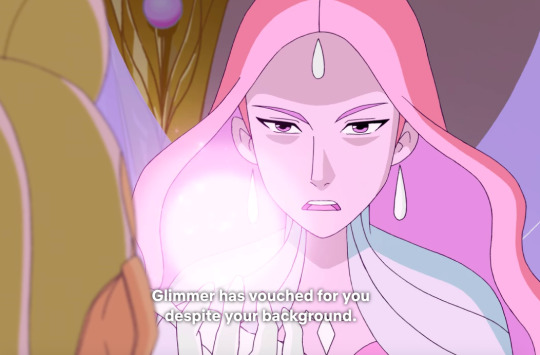
On the one hand I get why they have Angella be like this
On the other hand I'm like, do people here not know what "child soldier" means? Yes, Adora's old enough to make decisions for herself, but that's. Why she left.
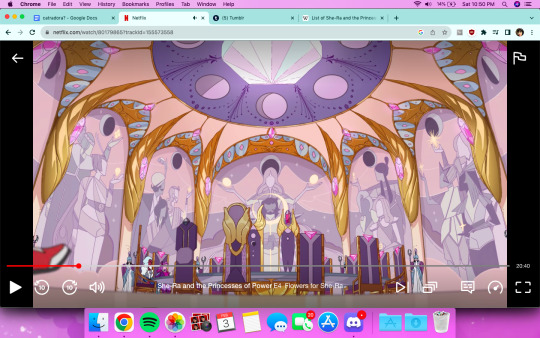
I feel like this is loosely inspired by really big pretty churches, but in a fairly neutral kind of way
Or maybe it's just that everything reminds me of Her
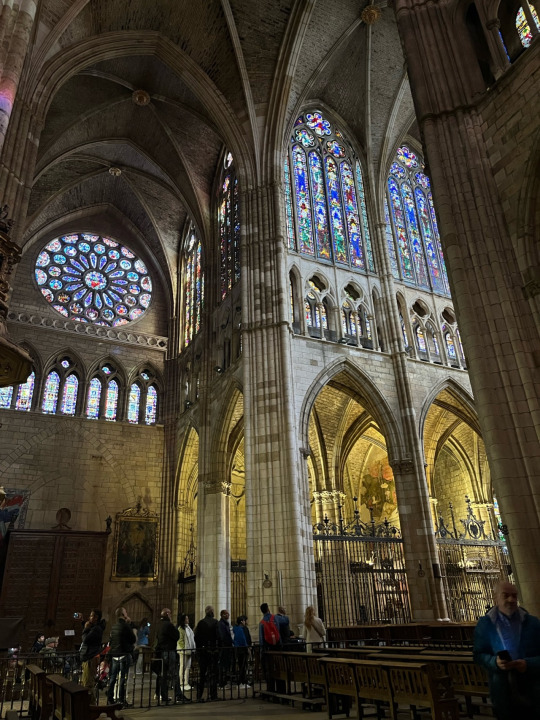
(The cathedral in Leòn, Spain; aka one of my fave places on earth, I'm always surprised this pic turned out as well as it did because when I took it I was crying, anyway)
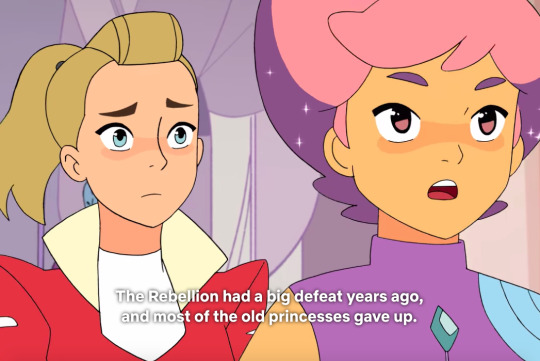
*squints* I forget if they ever explain which defeat they're referencing here, I'm positive they do but I'm blanking
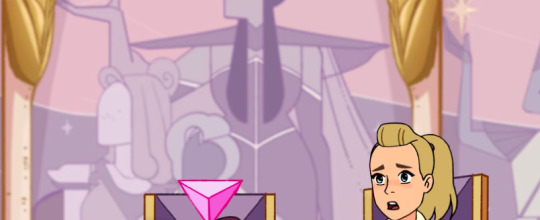
Is that Castaspella on the mural
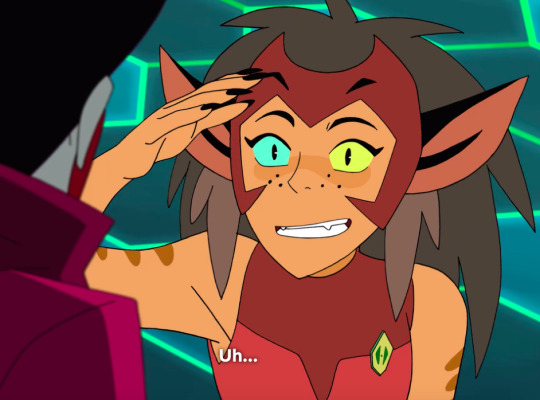
Catra's little "prrp!" here was almost definitely involuntary, and I love that they had her do a "surprised kitty" sound
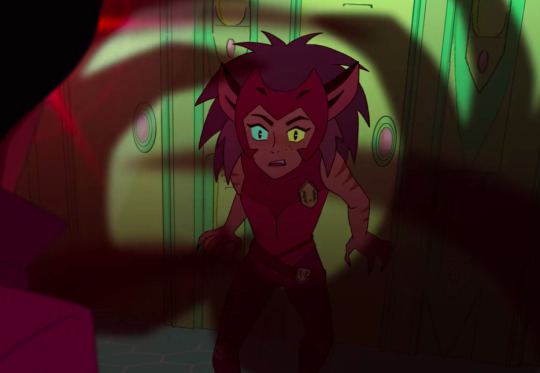
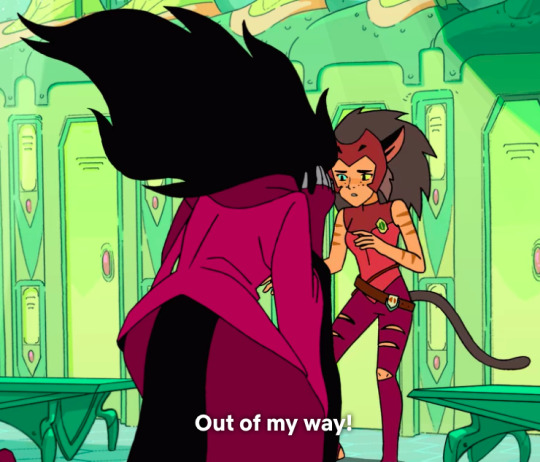
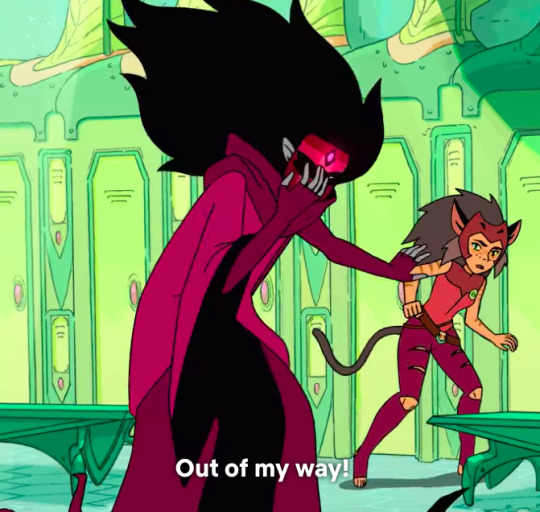
Okay so Shadow Weaver is like NO I KNOW YOU NO MORE ABOUT ADORA AND YOU'RE NOT TELLING ME and is visibly threatening Catra, but then her crystal thing starts to hurt her, and as she backs away Catra reaches for her before Shadow Weaver slaps her hand away, have I mentioned how well they portray child abuse survivors
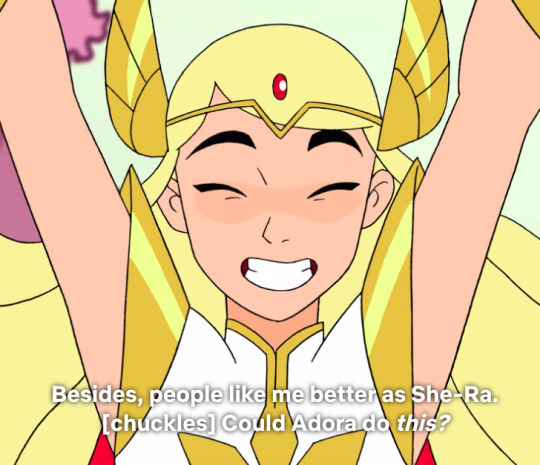
:(
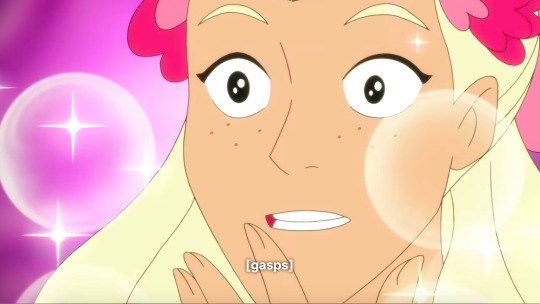
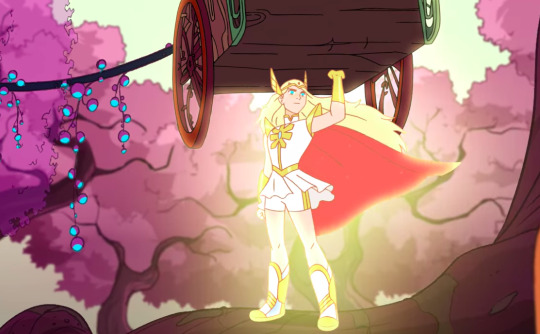
BAHAHAH that's gay
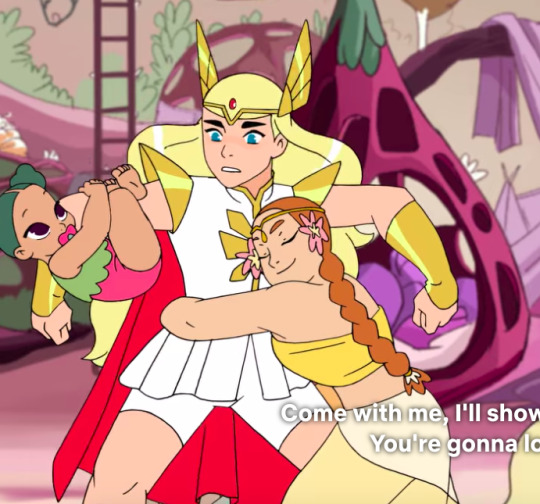
the village hoes just be throwing themselves at her amiright
(I don't mean the baby obviously)
Note to self for later, writing reasons: the Princesses all have literal physical objects that are the source of their powers
Man I can never get over the degree to which Perfuma reminds me of a friend I had in the late '00's, a tall thin blond sorta-hippie with long hair who REALLY tries to think positive and loves trees and flowers
Hordak: why are u still so obsessed with blondie
Shadow Weaver: i'm not
Hordak: you are so full of shit. give it up or no more magic for u
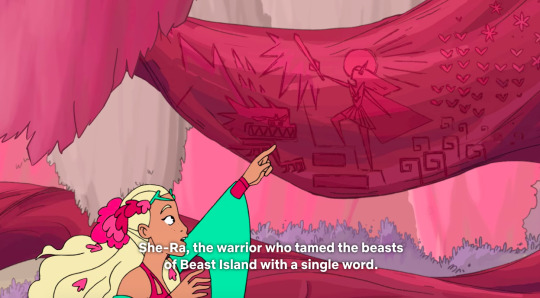
Poor Adora had NO idea she had to fill shoes this big or old
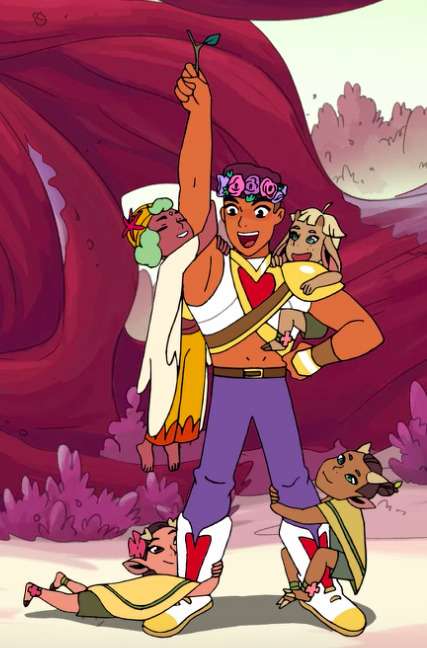
Bow will make such a great dad at some future point
Wait I gotta include that in my fic *runs off to write notes*

accidentally took the worst screenshot lol plz enjoy
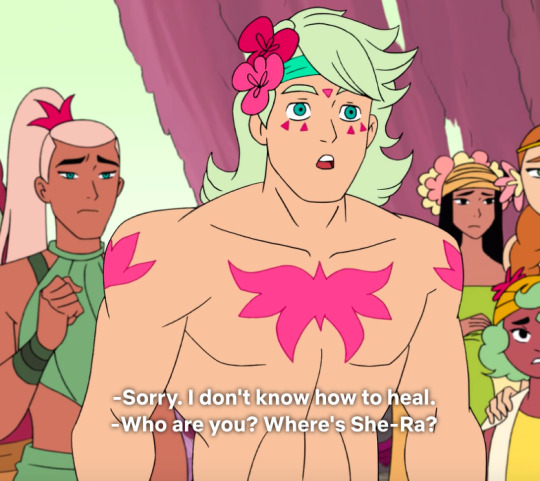
This Ken lives in Plumeria!
Perfuma: we believe karma will come for the Horde someday :)
Glimmer: or you could just fight them yourself
Perfuma: mmmmmno
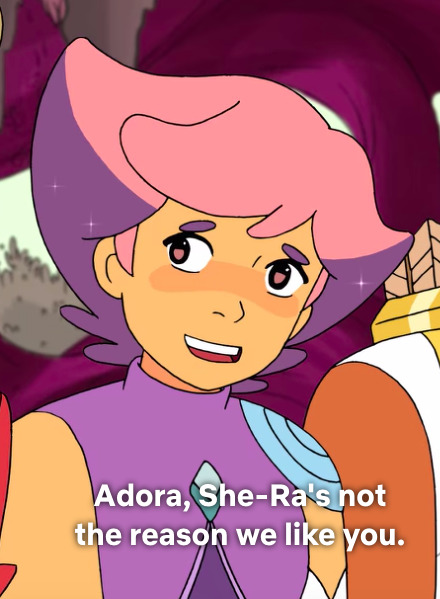
You're gonna have to tell her this like fifty more times
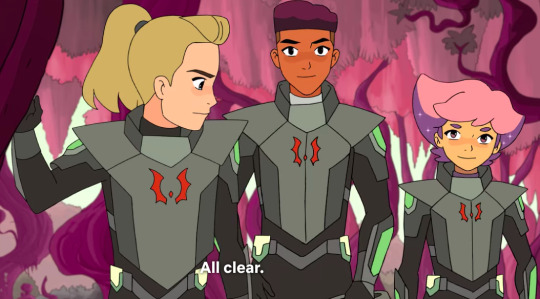
where did you get those
Boy it took like nothing for Perfuma to convince her people "actually let's go murder those sumbitches, call me KARMA AHAHAH"
Adora's actual magical ability: hiding that huge-ass sword no matter what she's wearing
All the green growing things taking over reminds me of scenes in Princess Mononoke, which was almost definitely on purpose
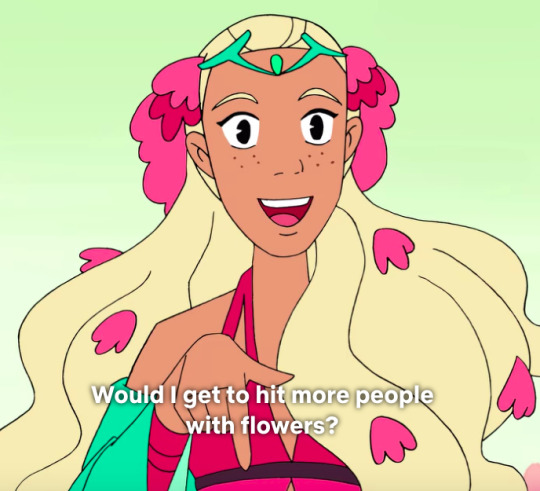
Perfuma has tasted blood and she's not going back
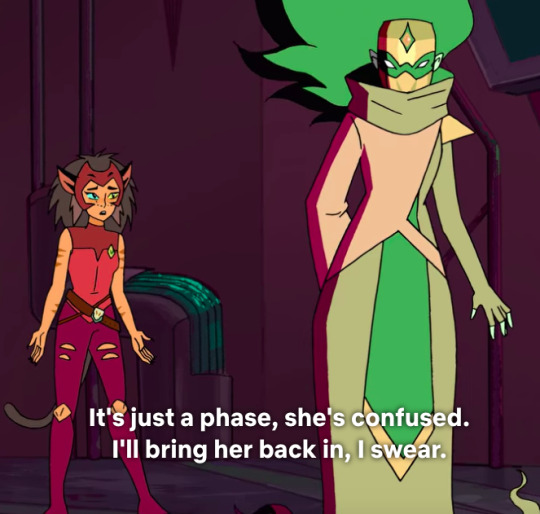
The parallels with "she's not really gay, it's a phase, she's confused, I'll get her to come to church" like I'm sorry but there's no way they didn't use that phrasing on purpose
Glimmer: if you were perfect you'd be HELLA ANNOYING
(she's not wrong)
ANYWAY my laundry was done like fifteen minutes ago but I wanted to finish the episode out :D
4/52
5 notes
·
View notes
Text
Our Black Gay Diaspora Podcast: Visibility For The Invisible Community
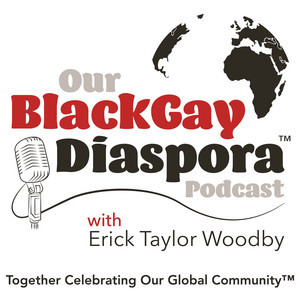
Finding podcasts that are ear worthy comes from a multitude of sources - friends, family, co-workers, articles, social media, and even the Ear Worthy Substack site where podcasts are reviewed and recommended daily.
In the case of Our Black Gay Diaspora podcast, I discovered it on the excellent Substack newsletter, BlkPodNews™, which was launched two years ago.
The newsletter's stated mission is "to help readers / listeners learn about and listen to new Black podcasts, new podcast seasons, and best episodes from Black Podcasting Awards’ winners in this weekly spotlight. It is 'The Podcast Industry Trade Paper For Black Podcast Creatives & Professionals.'"
You can sign up to be on their email newsletter list here.
On the newsletter, I came across an article about Our Black Gay Diaspora podcast.
It is a fascinating independent podcast. Our Black Gay Diaspora Podcast is a podcast (video and audio) where Black LGBTQ professionals share stories about their lives, countries and professions. Creator / Host Erick Taylor Woodby interviews individuals who inspire and educate others about who they are, highlighting a population often overlooked by mainstream LGBTQ+ and Black media outlets.
Woody is attempting to offer greater visibility in a world that often tries to make underrepresented communities invisible is such a large task.
Here is an Apple review that sums up the view on this podcast.
"Erick has presented an amazing and diverse group of world citizens with wide-ranging experiences, it is fascinating to hear these stories of how these People Of Color (POC) move in the circles of their lives, embracing their Blackness as well as their place within the LGBTQ+ community. It is so important to share this visibility, so everyone can come to understand the full length and breadth of POC/LGBTQ+, the work they are doing, and how they are shaping the world. This podcast is not just for POC, it's accessible to everyone and benefits people of all ethnicities with the stories being shared. I applaud Erick for realizing this gap existed, and I think he is doing an amazing job of filling in the blank spaces. Kudos to you! :)"
Erik Taylor Woodby is the creator, host, and producer of the global biweekly Our Black Gay Diaspora Podcast. As a contributing writer for the Swedish Krull Magazine, he shares stories and diverse histories chronicling the lives of individuals making a difference in their countries and professions.
Woodby is a writer, podcast producer, and graphic designer with over 20 years of experience working in media from logo and print design to multimedia, collaborating with clients that include a BAFTA-winning documentary protagonist, an award-winning yoga instructor, and an international investment banking firm.
In his bio, Woodby says: "My love of creative communication extends to learning languages and travelling the world as a digital nomad. I’m proficient in conversational Spanish and basic Swedish. And have visited Canada, Denmark, England, Germany, Mexico, Latvia, Norway, South Africa, Spain, and Sweden. Stockholm, Sweden, and Brighton, UK are two of my favorite cities."
Since starting the podcast in late March 2021, Woodby has produced 76 episodes, which is a remarkable feat for an indie podcast. Clearly, because of Woodby's design and media experience, the podcast has slick graphics, excellent sound quality, and the music and is created, produced, and distributed at a high level of quality. Kudos to Woodby for using his multiplicity of skills in podcasting. It's clearly paid off.
On the show, Woodby interviews guests including
Executive Director at PEOPLE Magazine Jeremy Helligar, Palmira Koukkari Mbenga, Swedish journalist, actor, and script editor for Netflix’s Young Royals, and Gamal ‘G’ Turawa, the protagonist in the 2022 BAFTA-winning British docudrama The Black Cop.
One of my favorite episodes was #6 when Woodby interviewed L.A.-based lawyer Thomas DeBoe. Imagine making an episode speaking to a lawyer about business contracts, family law, and joint ventures? zzzzzzzzz. But Woodby's calm, curious style transformed the episode into a fascinating look in DeBoe's life and career.
If you check out the episode roster of Woodby's show, you'll notice that the show length averages about 40 minutes. I personally love that sense of editing and respect for the listeners. Too many interview podcasts believe they can duplicate Joe Rogan and conduct interviews that run for an hour or two. They can't. Woodby has an innate sense of conversational flow.
Woodby is clearly an advocate of the Greek philosopher Aristotle, who once said, "Tell them what you are going to tell them, tell them, then tell them what you told them."
As a host, Erik Taylor Woodby is understated like low-impact aerobics. You still get the benefits but without the histrionics. His interviewing style is gentle but probing, and his cosmopolitan lifestyle has enabled him to glide without friction through numerous countries, ethnic backgrounds, and belief systems.
Two of my favorite episodes are the January 31, 2024 show with Pax Ahimsa Gethen, who is an American transgender vegan atheist, pacifist, blogger, photographer, and Wikipedia volunteer editor. In August 2023, Pax was awarded Wikipedia’s 2023 Media Contributor of the Year. Through their blog site, funcrunch.org, Pax is a dedicated advocate for marginalized communities, highlighting transgender and Black social justice causes and cultural milestones.
In episode 65 in September 2023, Woodby interviewed Rob Berkeley, who is the founder and managing editor at BlkOutUK.com, “a not-for-profit social enterprise run and owned by a volunteer collective of black gay men.” He's also a writer who contributed to the 2014 anthology Black and Gay in the UK. His story is titled The Brotherhood Dilemma. Described as an educationalist with interests in media, creativity, and the arts, Rob has a desire to disrupt power dynamics for the betterment of those on the margins of society.
At the beginning of the show, Woody says of Berkeley, "He is willing to upset the power dynamics for the benefit of those in marginalized communities." That's courage and passion.
Check out Our Black Gay Diaspora Podcast. You don't have to be gay, black or different in any respect to enjoy the show and learn something from the show.
************************************

This review is part of an ongoing series of reviews, recommendations, and essays about Indie podcasters -- their craft, their challenges, and the critical role they play in podcasting. These entrepreneurs display skills as disparate as hosting, sound production, graphic design, scriptwriting, interviewing, marketing genius, and financial watchdog. They are the heart and soul of podcasting.
0 notes
Text
halloween 2018 movie - Google Search
Sure the empire has done but they're kind of stupid it's causing huge infights between these people and a little with them and huge areas are vacated and basically we need the territory for some reason and I guess you don't understand it and you're too busy living the dream of getting rid of each other but we will fill in the blanks later. Right now we're taking territory and it's about the size of Spain plus one half of Spain and father and mother are saying no don't talk about us that way and would like to say is thank you and they probably don't want to hear that either is what they're saying and then you're welcome is this guy Trump is a pain and boy does he looks like a bum and he smells they said it too A lot of people say it to him you're a bum trying to steal cars and you smell and he looks at the real fast it says I'm a superior thief and really he's not he sucks at it a lot of people can't stand him because he sucks at it. Now we're rolling on a lot of things we're going to roll on his areas due to his massive number of threats it's just intense how many times it's way over the top and the empire is constantly saying we want you to and then no and they don't say they care and they're out sitting there test starts with the cadmium and that's reality and we too know how to use it and they are neglecting to understand that or acknowledge it. We are adding in the new area 7 very large bases and those are pretty big they're 20x20 but under them are five 20x20x60 bunkers each and it's for lasers and it is just like a obelisk but underground and we have structures top side to do sensing and so forth we also are building 80 large bases which are 10x10 and we are going to continue constructing them underneath a pretty good size bunkers they're 5 20x20x20 and we are also building and yeah we know you can see them 300 medium and there are five by seven or so and we're building tons of small ones and holding the territory and above its face the air the lands and below all the way to the core. We're also pulling chips out ourselves a lot of ships are left there it's way more than half and it's all over the place so you guys keep doing that and we are pulling out Caju the majority of which are Galactus and Galactica and the eternals and the infinites and they are gigantic annual rule the day that you were messing with us like we're little kids you are ignorant as hell here. There are other things happening but I wanted to announce that to make you people feel better
Hera
Zues
Olympus
0 notes
Text
.
#today i was in a group of students (we barely know each other)#and one of them was telling a 'funny story' about how his mother tried her best to avoid telling the rest of the family that#he has a boyfriend because they are 'very right wing'#(i live in spain. you can fill in the blanks)#and the sadness and shame behind that story flew over some people's heads#for context he is a very charismatic and charming person and a very good storyteller#but he also had some other 'funny stories' about his family basically not giving two shits about his wellbeing#and i thought that it was very obvious that he was trying to repackage and handle through humour what's basically a#profoundly lonely experience of being implicitly and explicitly rejected by your family#and another guy replied to the first story 'i would just tell them'#like no you wouldn't#and then the guy that was telling the story told him that you can't just go ahead and come out when you're financially dependent#on your family and that you can't just cut all ties with them like that because they are your family#and this guy is a very well-meaning person generally#but he just doesn't get it#so many things that i thought were obvious to straight people are apparently not#because many of them laughed at that story as if it were nothing
11 notes
·
View notes
Text
Veneziano is not useless and Romano is not abusive.
Rome never actually taught Veneziano to work hard for his appraisal. He just handed it out to him. You can't just do that to a child. You can't hand them everything without including a teaching moment. Without so much as giving them the occasional criticism so they can be accustomed to it later in life. And guess what? Veneziano is not accustomed to criticism.
Yes, Austria berated him. He treated him badly. But that isn't criticism. That's plain bullying him. Veneziano both expects positive outcomes and negative outcomes in life, which is good, but they're for certain things not everything. He expects praise for his art and when Austria told him to stop and that it was bad, Veneziano felt bad. Like bad-bad. Worse than someone who isn't used to being in trouble because Rome never punished him(as far as we know).
As we only know this from Romano's point of view, I can't say he WAS neglected by Rome. For all we know, Rome did pay attention to Romano but to Romano it wasn't enough because Veneziano was getting much more of it thanks to his natural talent. Its clear Rome cared for Romano and Romano reciprocates it. But without filling in the blanks, showing Romano with Rome and how he treated his oldest grandson, we don't know how their relationship actually was like.
The way Romano felt resulted in him becoming uncaring. He didn't care about putting effort into things without some reward in return, aka praise. Acting right because what's the point when no one cares? He insulted people because, as a child, he doesn't know how to properly process his feelings and how to cope with it. And this stuck with him through to adulthood because the adult who was supposedly caring for him only encouraged this behaviour by not telling him this was not okay. By not sitting down and talking to him. Tackling the issue at hand. Spain did not have an authoritative bone in his body to actually help Romano. He spoiled Romano, he handed it to him without hard work, something he was most likely previously accustomed to. But Spain let him get lazy. Let him misbehave.
Veneziano had everything at the start then he lost it while being with Austria.
Romano had nothing in the beginning then he gained everything when he lived with Spain.
If it were the other way around, Veneziano with Spain and Romano with Austria, Veneziano would truly become spoiled. I'd even say someone similar or exactly like Jeff Winger from Community; self centered, always needing to have the last word in, his ego is waaaay past the roof. He'd be so unbearable all because Spain further spoiled him. He has the thought that HE is the leader. That everything he says is right because no one told him otherwise. If he were to be in a situation to canon Vene, lets say being Germany's prisoner, he would be so confident in his strength to fight back. He'd overestimate himself, not bothering to calculate his chances against Germany. And when Germany lands him into a headlock, Veneziano being incapacitate, he would be utterly confused as to why it didn't work. Because to him everything goes his way. Nothing is supposed to go wrong. When it would, Spain would fix it. This would be a hard reality check, it would challenge what he's so used to. He'd be so thrown for a loop that he'd be frustrated, maybe even throw some sort of tantrum.
As for Romano with Austria, Romano could take two different routes; be the same asshole he is now while repressing his own problems to take it out on others, or become a major pessimist who doesn't dare insult even a baby in utero in fear of the consequences. If the latter is the result, then Austria would have pushed him into cleaning, basically pressuring him. He would nonstop find a way in making Romano do what he was told to do just as he'd do canon Vene(taking his paints away, no dinner, ect). He would also have the motherly care of Hungary to back him up and be willing to listen to him. He would most likely turn out to be softer. Nicer. More willing to open up his walls to people. All because someone helped him with the issues he already had. In a situation like canon, such as meeting Germany, he would not be so confrontational. He would show his fear, either keeping his distance or hiding behind his brother. He'd probably even be nice to Germany, showing his manners to him. But I wouldn't say he'd be friendly, just trying to be nice so he doesn't die for any reason whatsoever.
Both these possibilities are unhealthy just as the canon results are. Neither one of them are okay for various reasons, not just their upbringing. But their time with Austria and Spain certainly weigh heavily into who they are now. Other than being awkward, we don't know how unification shaped them either but I can take a guess and say it was still just as awkward as canon.
The point is, children are impressionable. They are clueless without guidance. The way they turn out when they're grown depends on how they were raised and what they were exposed to.
#hetalia#hetalia headcanons#hetalia veneziano#hetalia north italy#hetalia romano#hetalia south italy#hetalia austria#hetalia hungary#hetalia spain#hetalia rome#tw neglect#tw abuse
84 notes
·
View notes
Text
A deeper look at Merci Miles: (Warner Records, 2021)

Miles Davis: trumpet; Kenny Garrett: saxophone; Deron Johnson: keyboard; Richard Patterson: bass; Ricky Wellman: drums
By July, 1991 Miles Davis was music royalty. The previous decade saw him reach a level of popularity and stardom seldom seen in jazz. By the early 80’s the trumpeter had changed music multiple times, 4 to be exact, with his foray into hip hop, the first recording to be issued after his death Doo Bop (Warner Bros, 1992) , marking the fifth groundbreaking turn in his career. Prior to his passing from stroke complications in 1991, he maintained a vigorous touring schedule, and the performances of his sextet of the period, the finest late career band he ever led (and arguably one of the best bands of his entire career) were supercharged. The music captured on the newly released Merci Miles: Live at Vienne (Rhino, 2021) marks the first time anywhere save two YouTube videos the concert has been available in full, and is significant and historically important for two reasons: it is one of Miles’ final performances in France available legally, and it features two compositions by Prince, the cheeky entendre laden titles “Penetration” and “Jailbait” that the late icon wrote specifically for Davis.
The picture of the late singer/composer/multi instrumentalist’s involvement with Davis is much clearer through the release of Prince’s own Sign O’ The Times multi disc mega box set and the official release of “Can I Play With U?” a track originally written by The Purple One during the legendary Rubberband (Rhino, 2018) sessions. Prince’s track was going to be included on what eventually turned out to be Davis’ first album with his new label, Warner Bros. Tutu (1986) but was eventually shelved. The track was then slated to be issued in the original, much more substantial The Last Word: The Complete Warner Brothers Recordings box set from the early 2000’s (of which promo copies existed) but was fazed out due to rights issues.
The trumpeter always regarded France warmly, from the time he first set foot on French soil as a 22 year old in 1949. The country was also where in the late 1950’s he recorded the innovative soundtrack to Elevator To The Gallows or Ascenseur pour l’echafaud director Louis Malle’s smoky noir film of which the trumpeter’s soundtrack, completely improvised featuring a top French rhythm section crystallized some of the ideas the trumpeter later would apply on Kind of Blue (Columbia, 1959). France was also the setting for the infamous romance with the late French starlet Juliette Greco. More importantly, France, being the first country to wholeheartedly embrace jazz and recognize creative improvised Black music to be on par with European art music, was ready for whatever Davis brought to the table, instead of the misdirected pining that many fans and critics demonstrated in the U.S. for his past, acoustic centered work.
Merci Miles was captured on July 1, 1991 at the Jazz a Vienne festival, at a picturesque Roman amphitheater filled to capacity. 7 days later on July 8, Miles would revisit the material from Porgy and Bess, Miles Ahead and Sketches of Spain at the Montreux Jazz Festival with a double orchestra conducted by Quincy Jones and featuring the late trumpeter Wallace Roney as a second voice alongside occasional spots for alto saxophonist Kenny Garrett. The appearance featuring this music was followed by an appearance with former band mates in Paris on July 10 (a concert that unfortunately of this writing is being thieved by bootleggers for album release), and the European swing wrapped up in Nice, France on July 16th.
Miles’ band that July 1st evening, featuring Deron Johnson (who grew up with Miles’ nephew and former drummer Vince Wilburn, Jr) on keyboards; Kenny Garrett on alto saxophone and flute) lead bassist and Parliament alumnus Foley, bassist Richard Patterson, and the late Ricky Wellman on drums were inspired and smoking.
“Hannibal” written by Marcus Miller, which appeared on the group’s latest studio album Amandla (1989) is the high energy set opener, with the rhythm section of Johnson, Patterson and Wellman in perfect sync. Miles flies free with some solo lines before the head appears, and Kenny Garrett makes his first appearance with a lengthy solo. Garrett (who has a new Mack Avenue studio album in August) is like a heat seeking missile, the rhythm section responding and creating inner dialogues with him in response to his impassioned, pulpit stirring cries. Deron Johnson, often alongside with Garrett in taking some of the best solos of the evening, briefly dialogues with Miles before spinning off into his own, substantial solo turn. Johnson is a complete history of the keyboardist’s who played with the trumpeter and distills everything in his sparkling, distinctive soloing voice, swinging slightly behind the beat against the mightily funky bass and drums underneath.
“Human Nature”, the classic ballad from Michael Jackson’s Thriller (Epic, 1982) Davis first debuted on You’re Under Arrest (Columbia, 1985). The sensuous existential track became a blank canvas for the Davis band to paint on nightly. The trumpeter renders the melody with longing, then gradually shifts into a resourceful solo with a double time sprint. Within Davis’ solo and the use of Spanish tinged scales, and the colorful keyboard backing, the intense drama of the beautiful arrangements that Gil Evans crafted for Sketches of Spain (Columbia, 1959) which Marcus Miller expanded upon in a sense for the film soundtrack Siesta (Warner Bros, 1989) are clearly felt. Davis quotes “Nature Boy” and a few other asides before passing the baton to Garrett, who used the tune as a nightly feature for intense late period Coltrane trance like meditation. Garrett fits in a quote of the old spiritual “Joshua Fit De Battle of Jericho” before rocketing into space; Wellman in particular follows him wherever he goes. Every now and then Miles jabs some mood setting chords with his Oberheim OBX synth as cues, while Garrett continues to combust. The saxophonist bursting at the seams as a fragment from the bridge to “Milestones” is used as an ostinato, Davis signals a quick blast with his trumpet and the tune ends. Garrett brought the audience and listeners at home on a thrill ride.
“Time After Time” , the Cyndi Lauper classic is ushered in as volcanic applause erupts from the audience, nearly drowning out the music. For 9 and a half minutes, the show belongs to Davis, as he gently finds all the melodic contours he can in the tune. Like “Round Midnight” and “My Funny Valentine” of decades past, “Time After Time” became one of Davis’ signature ballads. He drives his improvisation the same way as Aretha Franklin, Pavarotti, Bocelli or Carreras would, with a marked sense of passion and timeless beauty.
Disc 1 closes with one of the Prince tunes, “Penetration” where everyone gets off on the raunchy funk. Davis and Garrett are one during the track, and it truly shows the admiration and border less musicality that both icons would have shared, Davis struts with swagger between melody statements and Johnson rips into his solo with passion, Garrett’s searing alto ups the ante further. As a contrast, “Jailbait” on disc 2, is a gut bucket blues where both Johnson and Garrett take scintillating solos..
The show closes with “Wrinkle” a wondrous maze of a melody that is awe inspiring when played a top speed, and “Finale” a drum solo feature for Wellman that showcases his patented bass drum triplets while keeping rock solid time on the snare, a sort of shuffle where the bass and snare switch roles, and some lightning samba as well as his signature Go-Go groove.
Sound:
Merci Miles is taken directly from the original tapes recorded and mixed by Patrick Savey and Mastered by John Webber at Air Studios in London. Similar to Sony/Legacy’s Bootleg Series releases for Davis, the tape is from the official broadcast, in this case captured by the small Zycopolis studios. Curiously for 1991, the sound is mono which could be due to whatever technical limitations of the tape, but it is very good strong mono. The Schiit Bifrost 2 DAC manages to wring out very nice separation for the band in the mono soundstage: In particular, Davis trumpet is vibrant, brassy, golden and present. Richard Patterson’s bass is commanding and takes the center of the sound stage, deep and rich. Ricky Wellman’s drums are full of gusto, there is a reason his nickname was “Sugarfoot” and you hear that in all it’s glory. Kenny Garrett’s passion radiates past the speakers, Deron Johnson’s keyboards float above the proceedings and Foley’s lead bass provides a wonderful textural contrast to everything else.
Concluding Thoughts:
The 80’s and early 90’s Miles cannon has seen relatively scant archival releases versus everything from the 50’s-70’s. Merci Miles is a welcome document of a band that truly was at the top of it’s game and at the peak of its powers. Miles Davis, judging from this concert was showing little sign of slowing down in his playing, there is a vitality and joy here that easily places this alongside his Montreux concerts of the period and the excellent Live Around The World (Warner Brothers, 1996). A wonderful present honoring the great musical icon thirty years on from his passing. The CD (reviewed here) and LP packages contain some particularly touching photos in a triple gatefold in the French Flag colors of Miles memorabilia from that final tour provided by Vince Wilburn, Jr and a superb liner essay from noted scholar Ashley Kahn contextualizing the history of the trumpeter’s French sojourns and the event itself, alongside some great photos. The cover also features some nice embossing of the album title text and Davis’ name. If there is any doubt about physical media, this album is a compelling case for why it’s so good to OWN a physical copy of an album.
Music: 10/10
Sound: 8.5/10
Equipment used for this review
Audiolab 6000 CDT transport
Schiit Bifrost 2 DAC
Marantz NR 1200 stereo receiver (as pre amp)
Marantz MM 7025 stereo power amplifier
Focal Chora 826 speakers
Audioquest Forest and Golden Gate cables
youtube
4 notes
·
View notes
Note
Hello, I've been trying to educate myself about Catalonia (currently watching Two Catalonias in Netflix, glad to have found your blog!). There's a lot of questions that Im desperate to have an answer for. Sorry bc I havent gone all of the timetable yet. I saw that October 2017 was when it became independent. But what is it independent for? Is it politics? Why is it still part of Spain now? Is there a different government body? I hope u dont take this the wrong way. Thanks in advance. <3
Hello, thank you for your interest 😄
It’s all pretty complicated but I’ll try to sum up the timeline and hope it makes sense.
A lot has happened since 2017 and it was... intense. This is going to be a very long post, so I’ll put it under the cut.
October 1st 2017: the referendum, considered illegal by Spain, police brutality against the voters, etc. That’s been talked about extensively so I’ll skip it. Anyway, the result of the referendum is 90.18% of votes for YES to independence (2,044,038 votes), 7.83% of votes for NO (177,547 votes), and 1.98% votes in BLANK (44,913 votes). The participation rate that could be counted was 43.03% of the population of Catalonia who legally can vote in normal elections. Actually, more people had voted but their votes were kidnapped by the Spanish military police when they stormed voting centers, so those votes were not counted. Other people wanted to vote but couldn’t because they the police attacked and closed their voting center, or because they’re not eligible to vote in elections because they live here but don’t have documents.
So we consider that a victory for YES.
October 3rd 2017: general strike. Ready to take control of the territory, a general strike is called and it is massively followed. The economy is shut down, highways and trains are blocked, etc. Here’s a post from that day. And another one.
October 10th 2017: president of Catalonia Carles Puigdemont declares independence and suspends it 8 seconds later. This was my post at the time:
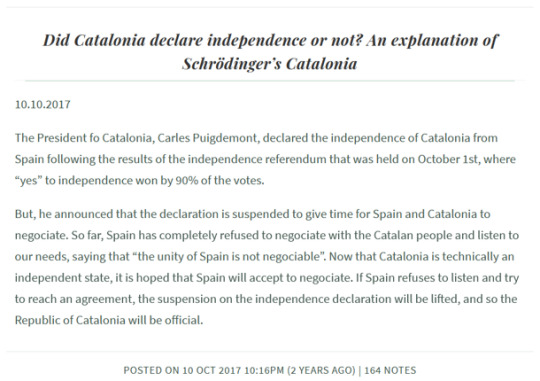
(Spoiler alert: obviously Spain refused to negotiate. Not only that but they went further in the repression. You’ll see.)
October 16th 2017: activists Jordi Cuixart and Jordi Sànchez (the elected presidents of the two most important pro-independence organizations, Òmnium Cultural and ANC respectively) are arrested and put in pre-trial jail. Many demonstrations around Catalonia the next days and weeks and months.
October 27th 2017: following Puigdemont’s words, since the Spanish government has explicitly refused to negotiate, the suspension on the declaration of independence is lifted. The Parliament of Catalonia declares independence (DUI = Declaració Unilateral d’Independència = unilateral declaration of independence). Thousands and thousands of people came to the streets to celebrate, and then in filled Plaça Sant Jaume in Barcelona (the square where the Seat of the Government of Catalonia is) and all the nearby streets and avenues. It was so packed that it was impossible to move, and there was music and singing all the time. We did this to protect the building, because we knew our government was inside signing papers and doing what was necessary to start to implement the Catalan Republic, and to make it absolutely impossible for the Spanish police and/or army to get to the Seat of the Catalan Government and arrest them.
Spain considered the Catalan government criminals and searched for them to jail them, but the following day they were outside of the country and nowhere to be found. The plan was to move to a more democratic European country and create a government on exile there which could effectively coordinate the culmination of the independence process and make independence effective. The reason they couldn’t stay in Catalonia was that they would all get jailed and would not be able to work from jail, so Catalonia would not have a government who could negotiate with the EU, Spain, or whoever was necessary, and who could continue the normal functions of a government to ensure the people of the country can still work and live, while coordinating the participative processes to create our own Constitution, tax collection, etc. But only half of the government made it outside... I’ll expand on this later.
Now let’s see what Spain was up to. The Spanish government applied the article 155 of the Spanish Constitution to Catalonia. This articles deletes the regional government and that comunidad autónoma (region) is ruled directly by the central Spanish government. In practice, what this means is that the whole Catalan government (elected democratically in legal elections recognized by Spain) stops existing, and it is replaced by politicians from the ruling Spanish party, which at the time was PP, a right-wing Catalanophobic party that had only reached 8.5% of votes in the previous Spanish elections in Catalonia. It was like a dictatorship. They controlled the public TV (read this) and banned the use of certain words, they fired people who had affinities with the independentist government, a lot of people went to trial (including even teachers) at the slightest suspicions...
And everything had to stop. Even things you wouldn’t expect to be affected. Everything was affected and the Spanish government’s presence. For example, my mother is a teacher of Catalan language in a public school for adults, and she had to ask permission to the Spanish government directly every time she wanted to use a printer (they were threatened that otherwise they could be sued for wasting public money). Sometimes they even refused her to print class exercises for the students. My department in university also had to stop all the research projects for the following year since they depend on the funds given by the Catalan government. etc.
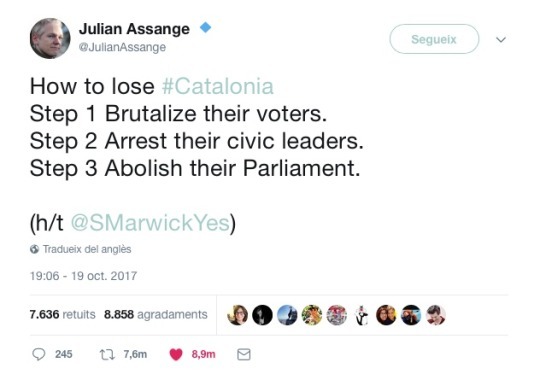
(You can see the whole post that screenshot is part of here)
Obviously, there were protests. During those days, we were busy with demonstrations and strikes, and then learnt that president Puigdemont and others were on exile in Belgium. There were some problems with Spain sending international orders of arrest against them but the crimes they’re accused of don’t exist outside of Spain so they were arrested and temporarily jailed in Germany but not deported. I won’t get in detail because it happened more than once and it would be long.
But half of the Government of Catalonia did NOT cross the border. The whole government, which was a coalition of the PDeCat and ERC parties, met in secret in Llívia (an enclave surrounded by French territory), and then the ERC politicians decided not to follow the plan. There are different reasons behind this change in strategy:
The need for political prisoners to prove that we are not exaggerating. The EU was not taking seriously how repressive Spain could be. They saw the police brutality on the referendum’s voters and shrugged as if nothing happened because nobody had died (though one man almost did). So some of the consellers (equivalent of ministers in the Catalan government) said that they would remain in Catalonia, and they were sure they would be jailed and this would show other countries that there was a reason for the Catalan Government to be on exile, it wasn’t just that they had left because they’re dramatic and don’t want to follow the law.
Jail as a loudspeaker. These same consellers said that being in jail would give them attention from international media that otherwise we wouldn’t have gotten, so they would use their time in jail to explain to the world what was going on and why their countries should show support to Catalonia. Political prisoner Jordi Cuixart later said that this has been the case for him, and he has met with important activists from around the world who came to visit him in jail, so it makes sense.
Aaaand whatever the hell vicepresident Junqueras was talking about. I still don’t understand. He should’ve gone to Belgium in my opinion. He’s just rotting in jail for no reason now.
So we have half of the Catalan Government in Spanish jails and the other half in Belgium. They still remain like that nowadays.
The two parties of the coalition that formed the previous Catalan Government (the one that Spain had dismantled) continued to fight among them. They later explained that Spain threatened that they would send the army to Catalonia and there would be a bloodbath. In phone calls, the delegates of the Spanish government made it clear that they were going to kill people and frame it as it was the fault of the Government of Catalonia. The Government of Catalonia did not want people dead, so they stopped calling on citizens to take control of the territory, the administration, etc. At the time, we did not know why they were suddenly silent, all they said was they were waiting for Spain to negotiate (and everybody was angry because we knew Spain would never negotiate, as Spanish politicians have been saying the whole time).
Then, the Spanish government forced Catalonia to have elections, since it considered that the democratically-elected Government of Catalonia was not in power anymore because Spain had fired them. There was a lot of discussion on what independentist parties should do. These were the different positions:
Catalonia has declared independence and we need to focus all our energy on making it real. All independentist parties have to be working on taking full control of the taxes, administration, and services. We cannot be a candidate to the elections of the Spanish region of Catalonia, because that doesn’t exist anymore and we are in the Republic of Catalonia now. The result of participating in these elections would be legitimizing Spanish rule. But if we don’t participate, only the unionists will vote and the whole Government of the Spanish region of Catalonia (the one that has the real power by now and is recognized by other countries) will be 100% composed of unionist politicians who will make our lives hell (like they did during 155). And the world might take this as “unionists won the elections, so that’s the only legitimate representatives of Catalonia to negotiate with”.
Independentist parties should participate and make the Government of the Spanish region of Catalonia be the Government of the Republic of Catalonia. It’s good that it’s an official legal election accepted by everyone, and there will be representation of all the inhabitants (whether they are unionist or independentist). Problem: this leads us back to where we started, with a Parliament that has a majority of seats for independentist parties but is still the Parliament of a region of Spain.
Independentist parties should participate in the elections of the Spanish region of Catalonia in order to boycott it. Basically, all independentists would be called to vote for their preferred independentist party (PDeCat, ERC or CUP), and once the Parliament of the Spanish region of Catalonia is formed, they never show up. More than half of the Parliament would be empty, so it would be blocked from being efficient. Meanwhile they would be at the real Parliament of the Republic of Catalonia.
After a lot of talk, they choose the 3rd. In theory.
Elections happen, with pretty much the same results from the previous elections so PDeCat and ERC form a coalition government with support from CUP. But the politicians who are in jail or exile are outlawed by Spain and could not participate in elections, so they do a “symbolic” president, Quim Torra, who is like a spokesman for the real president Puigdemont in exile.
So with the leaders of the two bigger independentist parties and civil organizations in jail or on exile, media still banned from using certain words, people getting arrested for taking part in the general strikes, and a general feeling of uncertainess, things started to go very badly.
Suddenly ERC (social-democrat independentist party) decided that we had already failed, and that this showed that the DUI (unilateral declaration of independence) was always going to fail because so many important elements of an independent state work automatically (for example, taxes of Catalan people are automatically sent to Spain, they don’t pass through the Catalan gov, and it’s all informatic so it’s not like we can just stop the caravan that is transporting the money because there is no such a thing) or other mechanisms needed for a country really become independent unilaterally (aka without Spain agreeing) are just impossible for us to create without the support of other independent countries or organizations like the EU or UN. From then on, ERC has defended that we need to find a way to negotiate with Spain and do a referendum that Spain recognizes as legally binding, but Spain has shown they don’t want to let us vote, so we need to be strong enough to force them to have to agree with us. “Strong enough” meaning to have the huge majority of Catalonia be in favour of independence, have the Parliament and other representative bodies be almost absolutely pro-independence, have the councils of all major unions be in favour of constant mobilization for independence, etc. So the most repeated sentence by ERC is, to this day, “enxamplar la base” (make the base/grassroots wider), and that’s what they dedicate most of their efforts towards, trying to convince undecided people or Spanish leftists or left-leaning people who they think can be convinced.
CUP (anti-capitalist independence party) said that the important thing to become independent is the support of the masses and constant mobilization. We already had a majority of the population in favour of independence and they showed to be ready for constant mobilization. General strikes had been successful, so what we needed was to do an indefinite strike (so, instead of just striking a couple of days, declare a strike that would not end until our demands -independence and freedom of political prisoners- are met). This is difficult because most people cannot afford to stop showing up to work for such a long time as would be needed, and the solidarity funds (the collections of funds used to aid workers who need it during strikes and to help pay for lawyers or whatever the repressed protestors need) could never be enough for a whole country. Nevertheless, lots of people are ready to make sacrifices.
And the other party, president Puigdemont’s PDeCat (the liberal independentist party). They said that we had to work harder on having all the state structures (“estructures d’estat”, those words are used a lot). State structures would be all the things necessary for a country to function independently. It includes the tax collection system, ambassies, administration system, justice system, police force (I know this is debated but at least we all can agree that we do NOT need Spanish cops imposing Spanish laws), postal service, etc. PDeCat’s efforts are centered on this, especially on economical aspects. They are still now working in this direction, with the idea that Spain will never agree to negotiate and so our only way of becoming independent is behaving like we’re independent: when we have our own tax collection, state services, citizenship, ambassies, etc. we will be independent whether or not Spain recognizes it, because we will be behaving independently and will not depend on Spain.
After that a lot of important things happened to, but basically the coalition government (PDeCat and ERC) fought all the time. As I just explained, their strategies are opposed, and ERC accuses PDeCat of being too radical and “scaring away” the Spanish left who could maybe one day let us have a referendum agreeded on with Spain, while PDeCat and CUP accuse ERC of having turned independence in a long-term goal instead of a short-term goal like it was until 2017.
So basically, we failed and did not achieve independence. We declared it but were not able to keep it going. Most people feel like the political class ruined it, because the people were ready to do what was needed (as proved in the strikes like October 3rd 2017, the occupation of the Barcelona airport on 4th October 2019, the so-called Battle of Orquinaona, etc). There’s been great protests until the covid-19 lockdown, it’s not like we ever really stopped. But most politicians seem too focused in fighting each other for the best strategy, especially ERC who is not participating in the meetings with the other parties any more. It’s all very confusing for the people, and it seems that we don’t know everything that happened in late 2017.
That’s pretty much it. I hope it was more or less understandable, and if you’re still confused, don’t worry, we are confused too. Now, seriously, if you want more clarification on any point you can send me another ask and I’ll be happy to answer. Meanwhile, after remembering all of this, I will be crying in my room ✌️ (jk)
25 notes
·
View notes
Text
Dating Disney: The Little Mermaid

So when I started, Dating Disney, it was with the intention to pin down the fashion validity of Disney’s leading men, but when I started looking at Eric, I found that he’s wearing very hard to pin down clothes. A simple shirt, some pants, boots, and possibly a cummerbund? Or a sash? It’s really unclear. So rather than that, I decided to use clues in the movie to pin down a general historical time frame and location for Disney Movies, and I’m not really going in any order. I stand by Sleeping Beauty being set in mid to late 14th century Italy, but from here on out, I’ll be focused more on history and the movie, using context clues to set a time frame.
Story Origins
Den Lille Havfrue or The Little Mermaid, was written in 1836 and published in 1837 by Hans Christian Andersen, a Danish writer. It was written initially as a discreet love letter to Edvard Collin who had won his fancy. Edvard had gotten himself engaged to then 13-year-old Henriette Tybjerg 3 years earlier in 1833. The story is a highly symbolic depiction of Andersen’s feelings, as Edvard represents the handsome prince, Henriette is the kind foreign princess taking the love of his life, and Andersen is the suffering hero who endures great heartache to be near the one he loves, and is effectively voiceless, unable to speak his true feelings due to the time when he was living in. Henriette was actually so worried that he’d make a scene and declare his love for Edvard at their wedding that they “accidentally” gave him the wrong day, and he missed the ceremony. Thus, Andersen wrote the little mermaid disguised as a wedding gift, which Edvard had little interest in and which Andersen later decided to publish. I won’t do this for all of the stories, mind you, but this one had a very interesting history behind it.
Clothing
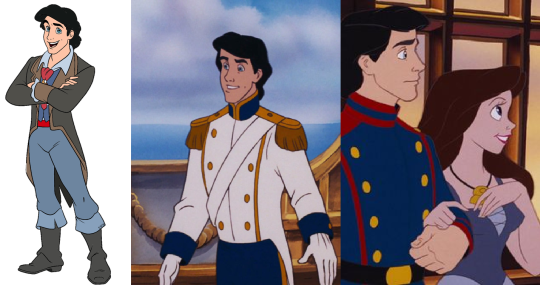
The first costume doesn’t appear in the actual movie, but is used occasionally as part of the Disney Prince line-up attire that Eric sports. In this image, he’s sporting a waistcoat, cravat, and tailcoats, all indicative of 19th century men’s fashion. In particular, this look rose to popularity in the 1840s and stayed popular through to the 1850s. Eric’s wedding suit and the engagement suit are both military jackets that include epaulets on the wedding suit. These are in fact naval admiral jackets, as seen in the below picture.

All of these fashion elements emerged during and following the Napoleonic Wars (1803-1815). Most of the men except Eric have buckles on their shoes. Although we might associate the image more with the 18th century and the American revolution or pilgrims, buckled shoes were still a common sight in the 19th century that it’s not out of place or unreasonable for them to worn in this film.

The widely hated pink dress (and quite unfairly I think) that Ariel wears to dinner seems to fit with 1850s fashion although the large sleeves were apparently designed to resemble 1980′s prom dresses. The blue dress Ariel wears for the date is entirely era inappropriate (especially since her ankles are visible during the Victorian Era), and neither hers nor Vanessa’s corset dresses are fitting for their time period. It should be noted that the visible different skirts was not a trend of the 1800s, and this was the closest example I could find, and even then appears to be an outlier in what’s been recorded of 1850′s fashions. Now, it’s possible that this dress could be old and was just lying around, so even Ariel’s dress is not necessarily proof of a finalized decade, since she could simply be wearing an out of fashion gown.
Technology

The Tobacco pipe that Scuttle calls a Snarfblat, seems to resemble a Calabash type tobacco pipe, first invented in 1898, at least according to one source I found. The Calabash is widely recognized for its saxophone shape, and is closely associated with Sherlock Holmes imagery. There are other types called Bent or Billiard pipes that may have existed earlier, but I couldn’t find when those kinds of tobacco pipes would have been invented.

Eric’s Ship seems to resemble a Galleon, mostly in the bent U shape of the ship and the bulky stern. An evolution of the Portuguese Carrack ships of the 15th century, these Spanish ships were invented initially as armed cargo ships, but were also used as warships. In the early 19th century, they were drafted as auxiliary war vessels, dominating naval warfare for most of the Age of Sailing. Although Eric’s ship is not quite a Galleon, given that his ship as a more noticeably protruding cabin on the ship’s stern, it still maintains the unique U-shape of the vessel.

The type of carriage we see when Eric gives Ariel a tour of his kingdom seems to resemble the Phaeton carriage. Both are four-wheeled carriages with a fold-up back and a swooping decal on the front of the vehicle. Shown to the right is an image of Queen Victoria as a child with her mother in a Phaeton. I don’t have an exact year as the link no longer works with the British Museum of History, but Queen Victoria was born in 1819, and she looks fairly young, so I might posit that this might date anywhere from 1822-1834? But I’m legitimately guessing. The point is, this type of carriage would have existed at this time and later.
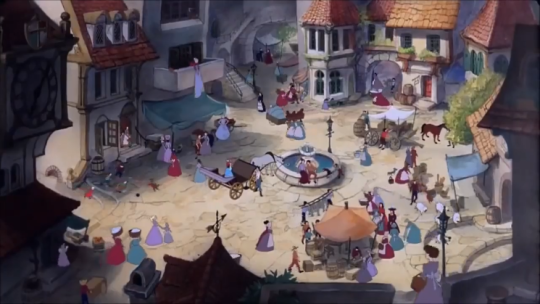
When we see the town square of Eric’s kingdom, we see a clocktower and gas lamps. While I couldn’t find an exact year of when clock towers became a common thing, the clock that houses Big Ben in Elizabeth Tower was built in 1844, so that’s a least a clue as to when a much smaller clock might have been commonplace. Gas lamps as a public source of illumination began in 1809, as commemorated by a political cartoon of onlookers marveling at the new wonder.
Geography & Climate

Hurricanes - when the sea storm hits, the sailors declare that the storm is a hurricane. Initially, I assumed the movie was still set in Europe, and I looked up and found that there have in fact been instances of hurricanes hitting the western countries of Europe. However, the palm trees kind of debunked that theory.
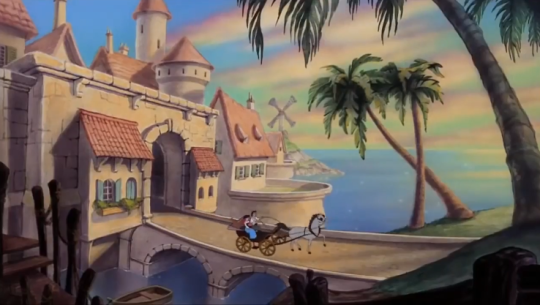
Yes, you are in fact seeing palm trees. Growing naturally. In the place Eric calls his kingdom. So we are definitely not in Europe. This is further backed by the fact that a hurricane hit only two or so days ago, and hurricane season tends to be in autumn, while the foliage in Eric’s kingdom is a vibrant summer green. This has lead me to the assumption that Eric’s “kingdom” is a colony in either Florida or more likely, one of the Caribbean islands. Which would most likely mean that Eric is a Spanish prince. This is backed up by the simple fact that the general aesthetic of not only the castle, but the kingdom has a very Spanish look to it. But I’m not really at all well-versed enough in architecture to elaborate other than “it looks kinda Spanish to me”. He could be the son of the Spanish king and ruling this local area due to its economic importance and could possibly have a warship to fight off pirates. Eric might also not be the first in line for the throne, thus this is why he’s so far from home and without any parents around. He came to the new world to rule a smaller slice of his kingdom since he’d probably never be king of Spain. And yes, I did find that there are marshlands in the Caribbean, so Eric and Ariel can still go for their boat ride through the bayou.

There’s also a portrait of Phillip and Aurora in Eric’s dining hall, which means he’s probably related to them. Considering they’re Italian and he’s Spanish, it’s extremely likely. It’s not super relevant, but it’s a neat easter egg. Or if it’s not Phillip and Aurora, it could be Eric’s parents, and it just looks a lot like Phillip and Aurora, which could still be a clue that they’re related. Although the painting is rather recent, not like a 14th century tapestry, so it’s probably either a painting of his parents, or Aurora and Phillip are a big deal in Eric’s family, resulting in them getting a more modern portrait made of them.
Verdict
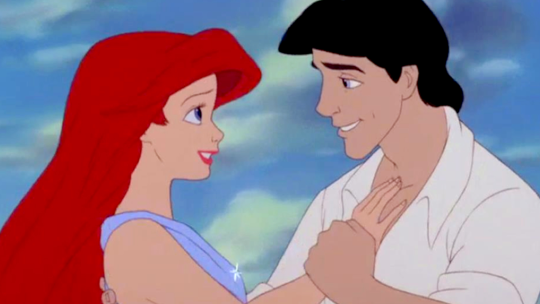
All around, I would have to say that the movie is set on one of the Caribbean islands under Spanish colonialism in around the mid 19th century. Although the pipe might be from a later decade, it’s such a minor detail, and so late in the century that if anything it’s an outlier in the data. Most of the facts tend to point more toward the early and middle of the 19th century, which is why I lean more toward the early-to-mid 1850s as the era of choice for this film. What this means for the world at large is that both America and France have denounced their monarchs. Victoria took the English throne in 1837 and has been ruling for about 20 years. Charles Darwin’s Origin of the Species sparks outrage among the public at the notion of being a monkey’s nephew. Furthermore, it pretty much dissolves the Little Mermaid from being connected to the Frozen/Tangled conspiracy at all, as Ariel is all the way over in the New World, while Arendale is half-way across the world. It’s possible that the ship could have been commandeered by pirates who sailed the ship to the Caribbean where it was sank, but that’s adding extra steps and filling in blanks to try and force the theory to work. So there you have it, Ariel married a Spanish prince who was a full on navy admiral living in colonial Caribbean islands in the 1850s. Honestly, I’m just as surprised as you are. I would not have logically pegged the Caribbean for the setting of the film. But, that’s where the evidence points.
SETTING: A Spanish Colony in the Caribbean
KINGDOM: The Spanish Empire (1492 -1975)
PERIOD: 1850s (Victorian Era)
LANGUAGE: Spanish
#dating disney#little mermaid#disney#ariel#eric#sebastian#ursula#history#19th century#hans christian andersen#princess ariel#disney princess#disney princesses#spain#colonialism#spanish#caribbean#prince eric#disney prince#disney eric#the little mermaid#disney frozen#frozen#tangled#disney tangled#fashion#clothing
3K notes
·
View notes
Text
The Sky is Dark and Filled with Ink (from all the words that time forgot) Hetalia fic
The air is dead, you think.
You take a breath, and it catches in your throat, stagnant, dull. There is no brightness to this day, no freshness to the breeze. The air is dead.
Or maybe it’s just you.
There are birds chirping outside your window, so you get up. You get dressed. The birds are still chirping.
“Hello birds!” you say, and you smile. You make yourself smile and you make yourself call out cheerfully to the birds, even though the birds are the only ones who can hear. Because it is a new day and you are Prussia, and you are still here. You want to live, you do.
Maybe that’s the problem.
You are feeling nostalgic today, so you go to where your diaries are kept, in long long neat rows.
Your life looks so very long, lined with words.
You walk to the very end, find your very first diary, because you are feeling nostalgic.
The book you take from the shelf is not the one you wrote centuries ago, your sloppy, childish hand smearing ink across worn vellum, already overwritten almost to the point of unusability. It is a copy of a copy of a copy, printed plainly on reasonably high quality modern paper. You had most of your diaries printed, not so very long ago, in plain, unpersonable bindings. You would have preferred to have copied them in your own hand, familiar, beautiful letters in solid black ink, your heart held between pages. But there was so much that needed recopying, doing it by hand would be impractical.
You might not have enough time.
You could copy this first diary by memory, you have read these words so many times. You read about healing and triumph and dreams of crusading, and you try to recapture a glimpse of it, that wide eyed innocence.
You were so very, very young once.
Your life is sketched out in ink, and you know much of it by heart, returning and returning to tell yourself the story of who you are, to remind yourself of triumphs.
Of course, you never wrote about the bad things. There is so much you never wrote.
There is a theory, you heard once, that photographs are bad for memory. Photos, in their two dimensional stillness, are lies, crystalized to immortality. You remember the pictures, sharp and exact in a way memories never can be, and forget events, sounds, smells, worlds in all their complexity. You create narratives around the photos in your albums, as the true knowledge of what was fades.
Your diaries contain all that you are. There is so much lost between their pages.
You do not write your diary now. You have not written it in years. You have nothing to write.
No, you could write. Your head is swarming with thoughts, more so than it has since you were small.
But your diary has always been about events, triumphs, not thoughts. Your diaries you keep secret, yes, and they are full, in their way, of your hopes and dreams, they are the world seen through your eyes and that is a very private thing. But your thoughts, your ponderings, your fears and theories, you keep safely locked inside your head. You do not let them out into the harsh light of objective reality, to become things outside yourself that exist. You keep them safe, hidden, to grow as you grow, to change as you change.
To be forgotten.
There are other things you could write. You used to write in your diary sometimes, of all the things that happened around you, but that turned quickly into a diary that was all about Germany. That is not what a diary is meant to be.
You could write. It is not as though you have stopped living, stopped doing. You could recount internet victories, or less than well thought out adventures with France and Spain. It is not that such things are too small, too trivial. You used to write about all the small things, once. A century ago, half a century, you would have happily recounted the mild disaster of you and a very drunk France in Brussels. But now it feels like too much effort. You are so very, very tired these days. Even your pen does not obey you sometimes.
Diaries are books you write for yourself for memory.
(And you know that a century from now you will not be here to read of lighthearted victories in the dark times.)
You close your diary and put it back on the shelf. You have a coffee date with Hungary. You are never late.
“How are you, Prussia?” Hungary asks, and there’s more weight to it than simple smalltalk, but you disregard that. You give her one of your best smiles.
“I’m awesome!” you say, “How’s marital bliss?”
It’s an evasion, but she allows it.
“You know we haven’t been married for over a century,” she says, and you roll your eyes.
“How’s life in sin, then?” you say. She laughs.
“Sexy,” she says, and you look appropriately disgusted.
Being with Hungary is something like home. She has known you longer than anyone you know, known you since you were children, and she has always been good with people in a way you were always a little in awe of. She sees straight through all of your facades, past all the parts of yourself you keep hidden, to the things even you never look at too closely.
And in return, you like to flatter yourself in thinking you understand her better than anyone else, are the first to be let in on her secrets, are the one for whom she has no need for disguises. You think, now, that that is not quite the truth these days. Austria and Hungary have finally straightened out their relationship, so that they not only love each other, but also know each other, deeply and honestly in a way you cannot touch. You find that you do not begrudge them this.
You say something that brushes at the edges of that effect, as your conversation wanders from personal lives in modern times to old battles and back again.
“What?” Hungary says, “You don’t want Austria’s every moment to be torment and suffering? Who are you, and what have you done with Prussia?”
And because it is Hungary, you could tell her that you no longer care so much for rivalry with Austria, that you are quite content to be, if not friends with him, then at least friendly adversaries, and that regardless of anything else, you want nothing more than her happiness. Because it is Hungary, you could say all this without feeling as though you were flaying yourself open, to reveal your own beating heart to her. Or at least, you would be willing to do so, and entrust her with your heart. But because it is Hungary, she already knows, and you have no need to say it.
“Oh well,” you say, “I guess I’ve mellowed in my old age.”
Hungary looks at you, and it does feel as if you are being flayed. Hungary looks at you, and she bites her lip, and the expression in her eyes is grief.
And oh, that was the wrong thing to say, because there are still things you hide even from her, aren’t there.
Age is a strange thing, when it comes to Nations. You live with Germany, who is still so young, at least in your eyes, that it hurts you, and you are friends with America and children on social media, and you spend your afternoons in the park with old people who are a tenth your age or less. But you aren’t old, not really. Hungary is older than you are, and so are France and Spain. But then, they aren’t old yet, because they aren’t dying.
But perhaps even Hungary is not always brave, because she doesn’t pursue it, she does not ask, she hides all traces of her concern, sweeps her train of thought aside.
“Wouldn’t that be a miracle,” she says, and you grin, crooked and devilish (alive, for now).
The conversation wanders on from there, but at the end of it, as you stand to leave, she holds your hand and says, “You know that you can talk to me, right?”
“Of course,” you say, wondering what she thought you were doing for the past two hours.
“About anything, ” she insists, “And if you ever need me, please call. I’ll be there. I’ll make time, I promise.”
And you… You don’t cry, because you don’t cry. Crying is not a thing that you do.
“Thank you,” you say, and your voice is small.
And then she hugs you.
You don’t know the last time someone hugged you.
Or well, you probably do, it was right before that thing in Brussels. You don’t remember most of that night too well, but France is an emotional drunk, and you’re pretty sure that most of the fiasco that followed resulted from drunk-you’s attempt to escape emotional vulnerability.
In any case, this is the first time you’ve been hugged sober in a very long time. And Hungary gives the best hugs.
Her strong arms wrap around you and she is warm and soft and kind in a way you have never known how to be. Your ribs are pressed tight against her, and you know that she can feel every single one of them through your clothes, and for a moment you are certain that you will turn to dust right there in her arms.
“Thank you, really,” you say, when she releases you. And she gives you a sad little smile that tells you that she knows you won’t take her up on it, but that she meant every word all the same.
When you are home, you take down your most recent diary, the one with three quarters of the pages still left blank, and write. It hurts more than anything you have ever written, and not only because even your hands betray you these days.
“Dear Diary,” you write.
“Hungary hugged me today. It was an awesome hug.
We talked for hours, and I said everything and nothing at the same time, and I think she knows that I am dying, really dying now. She held me tight enough, I think, that we could feel each other’s heartbeats, like she was trying to hold on to me forever. I’m sorry. There is so much that I never say. I don’t want to die.
Germany, if you’re reading this, know that I love you so much. There aren’t words for how much. Tell all my friends I love them too."
#aph prussia#aph hungary#fic and fic-like things#my stuff#All I really want is for Prussia to get hugs and tell people he loves them#unfortunately the only way i can make that happen is by killing him :(
10 notes
·
View notes
Text
Citizenship Matters
Citizenship is a complicated matter. Did you know that there are, at the time of this writing, 249 countries, territories, or areas of geographical interest on our planet? Of the 195 recognized nations, only 2 base citizenship on ethnicity (Liberia & Mali), 33 nations unconditionally recognize WHERE you were born as a determining factor for your citizenship (birthright citizenship), 16 issue birthright citizenship ONLY IF you petition for it, 39 base citizenship on the status of your parents or length of residency, 7 that grant citizenship only after you reach a certain age, and 4 that require both parental citizenship AND age requirements be met before one can be considered a citizen (details HERE). This list is not comprehensive, and doesn't even touch on the matters of DUAL-citizenship, but I'm sure you will agree that citizenship is, indeed, a complicated matter! But it DOES matter!

This is Kyong... My beautiful bride of over 26 years, and my partner as I walk on this Earth. Kyong was born and raised in South Korea, and according to the laws of that country, individuals automatically receive citizenship at birth if at least one parent is a South Korean national, whether they are born within the Republic of Korea or overseas. Since Kyong was born in South Korea, and both her parents were South Korean, Kyong was a South Korean citizen - and that was true, until 2002.
When my wife came to the US in early 1992, she didn't speak very much English at all. The US was a completely new world for her, with new customs, language and people - that were all SO different from what she was used to "back home." Supermarkets, wide-open spaces, everyone looked and sounded so different! We married in late 1994, and around early 2000, about the time Jake, our 3rd child was born, Kyong began mentioning that she would like to get US citizenship. I was quick to tell her no, explaining that she should be proud of her heritage, and that I would NEVER give up my citizenship, regardless of where I lived!
I must mention here that I never once thought that Kyong ever came to America "to become a citizen," as is a common thought that many have about people's motivations for US citizenship. On the contrary, Kyong had a great life, career and family that she left to come here. Even so, since the first mention of becoming a citizen, Kyong would occasionally bring it up from time to time, and I would continue to say that I didn't think it was right. Finally, in around late 2001, before our fourth-and-final child was born, Kyong brought it up again, and I asked her why it mattered so much to her. Her answer caught me off guard. She said "my husband is an American, my kids are American, I should be an American, too. I don't feel like I'm fully part of you because my legal citizenship is different!"
I was floored, and I could no longer deny her. Her motivation was not to dishonor her heritage, or walk away from everything important to her, but it was to tie herself "legally" to her family, her hopes and dreams, which were no longer in the country she was born, but in a country of her choosing. In her heart, she was already an American - not because of where she lived, but because her whole world and everything she loved was here. (And by mid 2002, she became a legal US citizen).
I've been to a handful of countries on Christian missions trips, and others for work or pleasure. I very much love to travel, and to experience new lands, new peoples, and new cultures. This said, I have never once gotten of a plane in a foreign land and said "I'm now a citizen of (fill-in-the-blank country)," simply because my feet were on that soil. No, everywhere I've been, for whatever duration I was there, I always remained an American citizen. Simply visiting a country does not change your citizenship, even if you learn the language, eat the food and wear the clothing. Citizenship is a right, and only available to those that qualify for it.
In Philippians 3:20 and Ephesians 2:19 we learn that, as Christians and members of the house of God, we are "citizens of Heaven." But how do we obtain this citizenship? Ephesians 1:5, Galatians 4:5-7, Romans 9:8, and Galatians 3:26 are but some of the verses that speak to our adoption into God's Kingdom through our faith in and obedience to His Son, Jesus Christ. So, just as the US provides "birthright citizenship," so, too, does the Kingdom of Heaven. When we are born into His family, we are citizens of Heaven, and co-heirs with Christ for all eternity! We ARE citizens of Heaven - but do we value it? Do we live FROM this place?
So if, as a Christian, I am a citizen of Heaven, but in the natural I am a US citizen, does that mean I have dual citizenship? Sadly, many of us live our life that way, but NO! 1 Peter 2:11 refers to believers as "temporary residents and foreigners" (NLT) on this planet - this is NOT our home - we are just visiting! Romans 12:2 warns us "do not conform to the patterns of this world," nevertheless we live our lives as if this is it - this is all that matters! Too many only give scant remembrances to our REAL home, and our eternal citizenship in Heaven. We go through our day-to-day lives building up for ourselves treasures in THIS world, giving very little thought, indeed, to our real home and where we will spend all of eternity.
Here's my point... we live from whatever citizenship we identify with! For my wife, although I had always identified her as "Korean," in her mind she was American - and had been for a very, very long time! She did not consider the food she ate, or language she spoke, or location on the planet as the reason for her citizenship, but her citizenship was where her heart was! She was an American because her husband was American, and her kids were American. If we had, as a family, picked up and moved to Spain, or China, or the Philippines, my wife would STILL have been American.
2 Corinthians 5:17-21 says
"Therefore, if anyone is in Christ, he is a new creation; old things have passed away; behold, all things have become new. Now all things are of God, who has reconciled us to Himself through Jesus Christ, and has given us the ministry of reconciliation, that is, that God was in Christ reconciling the world to Himself, not imputing their trespasses to them, and has committed to us the word of reconciliation. Now then, we are ambassadors for Christ, as though God were pleading through us: we implore you on Christ’s behalf, be reconciled to God. For He made Him who knew no sin to be sin for us, that we might become the righteousness of God in Him.
If we believe in Jesus Christ, and He is our Lord, then we are NEW creations. The old has passed away! We are no longer citizens of whatever country we reside in or have naturalization, but are citizens of Heaven, and whatever we lived for before is now changed... we have a NEW purpose - one of reconciliation. We are simply ambassadors here on Earth. An ambassador is a representative of one country, living in another. Although he/she may likely speak the host countries language and practice the culture, he represents and carries the full weight and authority of the country he/she comes from! He is IN a country, but lives his life FROM another one all together!
Are you a citizen of Heaven? Then live that way! Just as my wife's heart was drawn to be with her family, so ours must be drawn to be with our Father in Heaven! We have not been called home to Heaven, yet, but we should live FROM Heaven, should we not? And, when we do so, we have access to all of the provision and authority from our home, which is the Kingdom of God. Our time on Earth is but a breath, and our life on Earth is a vapor - yet we live as if we'll be here forever. Are you friends with the world, or does it hate you? John 15:19 says "If you belonged to the world, it would love you as its own. As it is, you do not belong to the world, but I have chosen you out of the world. That is why the world hates you." (Does the world hate you, or are you trying to curry favor with it?)
Citizenship matters - and we have been born into a Kingdom, and adopted as sons and daughters as Kings and Priests. We can no longer live as if our Earthly citizenship is of any value - and we must invite as many people to live in our Kingdom as we possibly can! There is power in our citizenship! There is authority in our citizenship! There is peace and rest in our citizenship! Why would we want to live and be from anywhere else?
Although there is still much to say on this topic, I leave you with this quote from Paul , in Romans 12:1-2
I beseech you therefore, brethren, by the mercies of God, that you present your bodies a living sacrifice, holy, acceptable to God, which is your reasonable service. And do not be conformed to this world, but be transformed by the renewing of your mind, that you may prove what is that good and acceptable and perfect will of God.
Blessings! Cap
2 notes
·
View notes
Text
When the Ineffables meet the Ministry
There is a language barrier, at first, because while each of Aziraphale and Crowley have each lived in Spain before (well, Castille in Aziraphale’s case), it was not recently and they are both rusty.
Amelia, of course, is practically bilingual, and smoothes the way as the vocabulary eases back (and Alonso is so, so happy to have people to talk to who don’t mock him for being old-fashioned when he uses vos rather than usted).
Aziraphale and Crowley both adore Amelia. She’s brilliant, compassionate, no-nonsense. Rebels against her society in order to get an education. In different ways she is exactly the kind of human they love. Aziraphale wishes they could introduce her to Pepper. They stay up late exchanging tales of writers and artists and composers they’ve all met. Velázquez tags along and keeps interrupting. He interrupts a *lot*. For once, nobody minds. Especially when he presents each of the Ineffable Spouses with a gorgeous sketched portrait of the other.
Alonso initially is deeply perplexed and keeps crossing himself around Crowley which the latter finds exceedingly irritating. He is close to panic the first time Aziraphale says something wry and disparaging about Gabriel, and that’s before they get on to the story of Armageddon’t. What changes things for him (beyond vos!) is when he hears the softness in Crowley’s voice when he talks about Yeshua. And then when Crowley admires his motorbike. And then when Aziraphale asks him for some sparring practice and it turns out they each have something to learn from each other.
After all, Alonso is used to learning, to changing, to growing. He does it all the time.
When Aziraphale meets Julián he takes his hand and doesn’t let go for quite a while. When Crowley meets Julián they get drunk together. Pacino comes with them, and helps Julián stumble home.
They don’t need to say much, though they do, in the end. Julián asks the best questions, the most painful questions, and they answer what they can.
But they don’t need to ask him anything, especially after Amelia fills in the blanks. They can see. It’s in his eyes.
Crowley inevitably adores Irene, and the feeling is entirely mutual. They drag Aziraphale to the finest gay bars in Madrid, then to a glorious drag show in Soho.
Aziraphale takes Angustias out for dinner and they giggle their way through it. Everybody else is faintly alarmed.
And then, Crowley and Aziraphale meet Salvador and Ernesto.
And they do get it. They do. Changing things might make things worse. Has made things worse, when it’s been done. Sacred trust. What people have died for.
But Crowley looks back at everything he’s been blamed for, taking credit for, mostly-inadvertently caused. And the things humans have just done to themselves and each other. All the pain, all the suffering. The deaths. Children. So many, many children. And this, this is the one power that neither Heaven nor Hell has ever had. The power to change what has been.
“I like you,” he says. “You’re... you’re a good men, I get it. But I don’t like what you’re doing. It’s... gah. I get that you may be doing the least wrong thing here but I don’t have to fucking like it.”
Aziraphale says nothing. He knows what it is to be a Neutral Good person working for an organisation that is at best Lawful Neutral while claiming to be Lawful Good, implimenting policies you wish you fully believed in, making excuses, some of which are even valid. He worries the velvet of his waistcoat, winces. Doesn’t miss the pained looks that Salvador and Ernesto are exchanging, especially when Crowley gets on to the subject of the Inquisition.
And when Irene slips Crowley the phone number for one Lola Mendieta, Aziraphale still says nothing. Nor does he say anything when Crowley mentions, casually, that he might have put her in touch with Newt. Just a hand on Crowley’s arm, a warning. Don’t take this too far, love. Don’t unravel the world, we don’t know where it will tangle. And Crowley nuzzles his hair, and whispers, “I know. Just need to spread a bit of chaos in the right place.” And that has to be enough.
Aziraphale sends a quiet word up to Her, asking for Her blessing on all these flawed, brave, brilliant, well-intentioned humans. And thanking Her that at least he’s never had to face the choices the Ministry face every day.
He would perhaps not be unsurprised to know that in a much angrier way, Crowley does something very similar.
They also both resolve that however stable the lad is now, they are never, ever, ever going to tell Adam about all this.
#well this ended up angstier than I intended#Good Omens#El Ministerio del tiempo#crowley#aziraphale#Amelia Folch#julián martínez#alonso de entrerríos#irene larra girón#ernesto jiménez#salvador martí#angustias vázquez#jesús méndez pontón#lola mendieta#velázquez#crossover#my Spanish is exceedingly rudimentary#I'm working on it#lola mendieta has a fucking good point#tw death#tw death of children#mildish spoilers for El Ministerio del Tiempo#up to about the end of season 2 I think
26 notes
·
View notes
Note
28 with methessence (suggestion: crystal drinking tereré) gracias y tkm bb!!
this is probably the most argentinian thing i’ve written and i’m not even mad at it. tkmmm 🥰
for my international buddies: mate is a herbs drink typical from argentina, people usually drink it with piping hot water, and then there’s tereré, which is prepared with the same herbs as mate but instead of water you add juice!!
28. “How can you drink that stuff?”
“How can you drink that stuff?” Jaida asks, pointing at Crystal’s tereré, scrunching up her nose.
It’s summertime, and the living isn’t as easy as Lana del Rey says; they still have the entire month of november ahead of them before vacations, and the heat is starting to become unbearable for everyone at the afternoon classes.
Despite the wave of heat hitting the state, there are punks that bring piping hot mate to classes, because why the hell not, right? Jaida has no problem drinking mate when it’s 40°C, under a broken fan as they hear the history teacher ramble yet again about why he despises Spain.
But she draws the line with Crystal and her stupidly sweet tererés.
It’s not that she shoves it down everyone’s throats, trying to fill some tereré vindication agenda or something, no; she actively brings her thermos full of juice everywhere, sipping on her mate at the same time she pours the liquid — quite like Maria Elena on that Casados Con Hijos prison episode.
Crystal sips loudly on her mate, staring right into Jaida’s eyes as she does so.
“What’s your problem, eh? It’s not that bad!” She defends herself, filling up her Mafalda themed mate again, much to Jaida’s annoyance. “C’mon, try it! It’s Tang juice,” Crystal says, in a sing-sang voice, pushing the mate in Jaida’s direction.
“To be honest, this hoe really does a good tereré,” Heidi pipes up, turning around in her seat. “If you don’t want it, I sure as hell do.”
Jaida cocks a sly brow, staring at the Mafalda cup as if it was the most cursed thing she’d ever seen. Crystal begs her for a full minute to please try it out before she gives in with an annoyed groan.
“Fine! But if I get diabetes after this, I’m blaming your stupid tereré,” Jaida complains, harshly grabbing the mate and giving it a sip before she regrets it.
Just as she expected, it’s sickeningly sweet and her taste buds might just have had an overdose — but it’s not bad, per se.
She looks at Crystal, and she has this expectant look in her eyes, with that goofy smile she always has. God, she loves her but right now she can’t deal with that if she wants to win this argument.
“So?” She asks, with that shit-eating grin she always has when she knows she’s right. Jaida merely pushes back the mate, her expression blank.
“It’s as disgustingly sweet as you,” she deadpans, and Crystal coos loudly.
“I’ll take that!” She chirps excitedly, finishing the tereré so it doesn’t go to waste, and Jaida really doesn’t know how her bladder can stand all that juice.
12 notes
·
View notes
Photo
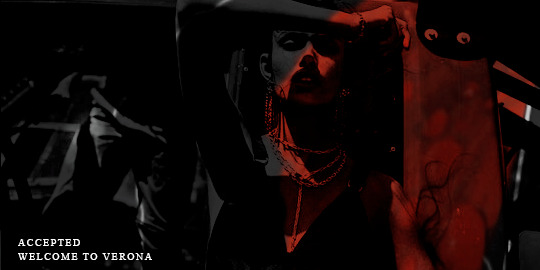
Congratulations, BRIDGET! You’ve been accepted for the role of POMPEY. Admin Minnie: I had some trouble writing Piero in the beginning; in fact, I rewrote him a few times because I couldn’t find the right words to describe the core of him. But you, Bridget, nailed it exactly in ways that I had not even seen myself. You made him utter real — sometimes uncomfortably so, all of that feeling and pride, As I was reading your application, I immediately felt like he was already yours. I really tried to pick out my favorite line in your application, the detail that really drove it home for me — but the truth is, Bridget, you won me over so thoroughly that I love it all. I cannot wait to see you on our dash again, Bridget, and I’m so happy you’re back! Please read over the checklist and send in your blog within 24 hours.
WELCOME TO THE MOB.
OUT OF CHARACTER
Alias | Bridget
Age | Twenty-two
Preferred Pronouns | She/they
Activity Level | I’m either gonna be on every three minutes or three days apart, there is no in between, but I promise to keep my activity constant and in line with your standards and let it be known if I am having any struggles with meeting them.
Timezone | EST
How did you find the rp? | Hazel
IN CHARACTER
Character | Pompey ; Piero Montrelle Ruiz
Piero ; italian: rock
Montrelle ; italian: mountain
Ruiz ; spanish: famous ruler
What drew you to this character? |
Listen, I made a meme when I was apping Hazel, Imma show y’all right now:
It’s a dumb meme and I’m sorry, I couldn’t help but share it.
I honestly play characters like Piero more than I play nicer, more morally-sound characters like Hazel, but I wanted to try something new, so ultimately I decided to pursue Hazel at the time. That said, as much as I love Hazel and would love to write her again, I kept thinking about Piero and his youth and ambition, and so now here we are, me obsessed and wanting to write him.
Okay, rambling ? Done. Let’s do this.
Something about Piero just screamed to me boy king, and that’s just my style. It was in the way he put himself above other children, his pride and his ego. He was born to be something and, in his youth, before he knew of his parents’ empire, before they told him who he was meant to be, he was searching for it. He couldn’t find in it eager kiddy games, he couldn’t find it in chit chat or childhood experiences. But there was something that rushed through him when he saw them stumble, he found satisfaction in figuring things out ages before them. It was in feeling better than them, feeling stronger and superior, and — simply, just being better. He had no time for laughter, for foolishness. What was the point of that, if not to waste time ? ( He was a mean boy, but his parents never pushed him not to be. If he caused another to bleed, it was their fault for not defending themselves. If his whispers of cruel words caused them to weep, they needed to strengthen their mental fortitude. No fault was to be found in Piero ).
I also want to pinpoint there’s something about Piero that also reads naivety to me. He considers himself wise and intelligent, and to some point I do agree ( books and tutors can teach, and they do ) but there are other notions that bring out his youth. It’s in his eavesdropping on his parents — yes, he was young when it happened, but still someone wiser would have understood that some secrets are such for a reason. Instead, he lusted for the unknown, something bigger than himself ( this — as well, is something I’d like to focus on, but I’ll come back to this later. ) and he found himself frenzied until he was finally privy to the family secrets. I see him as being inexperienced, someone who doesn’t have quite the worldliness as someone twice his age or even someone who had to struggle for basic needs during their childhood.
( Also, there is the fact his parents groomed him as being special. He never earned the title, instead it was bequeathed unto him from the very start. His parents claimed he walked younger than most, talked younger than most. He excelled in classes, he excelled in his physical ability. Again and again, his parents claimed him remarkable. I think, amongst the Veronesi, it might be time for him to realize that maybe he isn’t more than his name. This probably should go under plotting but I’m imagining him seeing others with skills he was never taught, maybe those his mother would have considered barbaric and uncouth. Piero wouldn’t see that, though. He would see force and deadly talent and he would see the areas in which he holds deficits. Also, just the ability and skill that comes with time and practice beyond natural talent. I keep reminding myself that, although a little bit weary with a lot of trauma, Piero is still nineteen. I used to think that was so old and so mature, but he’s barely more than a kid. Fun Science Fact: brains aren’t developed fully until their mid-20s !!! Some studies suggest early 30s !!!! Piero hasn’t even reached 20s !!!! He’s still baby !!!!! He’s going to make mistakes and learn and he might be reluctant and angry to do ( please see trauma re: parent death and assassination attempts ) so but he’s gonna do it to better himself which is what he wants to do !!! )
Piero learned so much from his parents, from tutors and teachers alike, but there is something more about experiencing things for himself and not just from the words of others and that’s where his youth shows. The first time he fought, really fought, not for practice or for fun ( something about him just coded him as a bully in my mind, one who’d pick a fight with someone who, one, would fight back, and, two, someone he would definitely beat, but I digress ), in my mind, was when Tiberius came to kill him. There was a fight or flight reaction and he was proud and cocky and pumped up on adrenaline because — this — this was what it was all for. He fought with a flurry of fists, frenzied, wild. In that moment, he knew this for certain: Ruizes were powerful and forceful and they would not flee. If he died right then, so be it, but he wouldn’t have looked death in the face and accepted it.
Okay, so this has turned into a rambling character analysis, and I apologize because I said I was done rambling, and clearly not. That said, I don’t regret it. I just have so much passion and fervor for Piero and I could write a ton more. I might. Later. We’ll see.
I just can’t help but be captured by how striking he is. He’s new to Verona, new to this scene of criminal seediness because this is when he’s finally beginning to get his hands dirty, beyond the basics of opening his eyes. His parents were introducing him to this life, but they didn’t let him delve too deep. They were bringing him in slowly, and then they died. He had nothing right then, nothing but his name and its weight. That wasn’t enough, but his brutality was. When death came for him, it made a mark on Tiberius for him — maybe all of the Capulets, too — and now he’s determined to leave a stain on all of Verona, perhaps Spain and the rest of the world, too.
I originally saw him as something of a blank slate when it came to his being in Verona, but after thinking it through a tad more, he isn’t. His parents wrote his future for him with the very incident of his birth, and now he is filling in the blanks that have been left for him after their deaths. Verona — the Capulets — they are a step in his path to power. Here, he could find allies — he already has enemies — and he learned at a young age the value others could be in company. Over time, maybe they will see that he is someone with a bright future, someone who should be watched carefully because blink and you’ll miss his grab for something better.
He should not be overlooked and that is something I think people might do. Sure, his family had a reputation, one that might cause some pause, but they might think he isn’t them. He is young and inexperienced, but there’s a chip on his shoulder and in his mouth is a taste for blood. He won’t go down quietly or without a fight. He is watching and waiting for chance and opportunity. He’ll prove any doubter wrong, he’s sure of it with all the self-confidence and egotism a princeling could have.
What is a future plot idea you have in mind for the character? |
1. Emotional Motion Sickness: Something that struck me about Piero is how he once wore his emotions on his sleeve. He fought for his life, fueled by loss and grief. He has a practiced void in his eyes and locked tears away. In my mind, this is not him, it is not in his nature. He was the sort to be fueled by idle amusements, wanting satisfaction, his eagerness knowing no bounds. He feels, and he feels immensely. It could be said it’s what he does best. But now? He is quiet, showing little. It’s vacant and a little numbing, and the void in his eyes is cold and distant. What his cards are and what he intends to play are known to him and him only. I can’t help but think that maybe, one day, he is going to break, the facade dropping, eyes blazing. Anyone caught in the crossfire surely would regret their taunts and jeers.
1. I just have this vision of him snapping. It would take a lot — honestly, a lot — because he’s created this solid version of himself, almost patient, somewhat mostly obedient ( I do imagine he chafes under rules a little — more than a little bit actually, but he bites it back time and time again ) but unfeeling. Jibs and jabs don’t get to him. They seemingly roll off of his back. I have to say that isn’t the case. He’s proud and he can only take so many insults. If — actually, when — he breaks, it’s going to have been a long time coming. The facade will start to break, cracks showing in the twitch of his fingers, the tension in his jaw. Maybe it will earn him respect from those around him when he snaps and demands more for him — he’s more than just the last of the Ruizes, living off of the faded glory of their name, and he’ll be damned if he’s not allowed to show it — but maybe it will only be a reminder that he was a loose end, and he was meant to be dead to begin with.
2. Who Am I? You Decide: He comes to Verona and what’s most obvious is that he has offered himself wholly to the Capulets. It’s not what his parents did — they were owed power for their allyship while Piero is now owed nothing. At the beginning, he is dutiful and obedient. He’s got nothing to lose but he has everything to gain here. He has to prove himself, really it’s his main goal. To do this, he finally understands words his parents told him so many years ago. Detener la marea y esperarar al momento adecuado: Hold back the tide and wait for the right time. He’s trying to listen and be quiet and wait and watch, but he’s never known patience well. He acted and reacted in his youth — power and privilege granted that ability — and this restraint is taking a lot of effort.
1. The facade crumbles and falls slowly, piece by piece. It starts with remarks and quips that are a touch too dry and that have too jagged an edge to people who don’t matter. It then escalates. He tries to manipulate situations where he sees a chance to take hold. He bites when he should be muzzled ; he acts of his own accord. I have no doubt that his own desires and whims to take action will get him in trouble. He is a wicked boy and always has been, soul stained black by birthright and only darkened with time. He found thrill in other people getting hurt, whether by his hand or not. He found glee in twisting his words to twist knives in others’ hearts. Maybe he learned it from watching his parents — they were by no means good people — but maybe it was part nurture, part nature. It was fate to be bad, or at the very least unkind.
2. His true nature shows in these ways: he speaks when he shouldn’t, he becomes too comfortable around Tiberius, a man who is like a friend and a brother, but ultimately was the man who was meant to kill him. It shows in his interactions with Vivianne, charm oozing, frenetic words of grandeur and idyllic plans slipping from his lips in eager commentaries about Verona and Spain and the whole world further. He speaks to them as if they are not his betters — as if he is more than even an equal — and soon it is not only them. It will become everyone.
3. Throwing Rocks Around Your Room: Everything in his life has been destroyed or taken from him in irreparable ways. This new life, this new existence, a part of him wonders how long it will last ( there is, of course, a certainty that this has to last. It’s this life in the mobs, or death. No middle, no escape. All or nothing. Black or white ). He seems so neutral, so unmoveable, but his head is a wrecking ball. He thinks of ways to destroy not only himself but all those around him. A part of him thinks the Capulets are to blame for the ruination of his family and their name — exceedingly childish, for sure — but he wonders what it would be like to see them crumble, perhaps making a martyr of himself in the process. The one flaw to this is that he does not want to die. For what use was him surviving this long if it comes not to a head ? He needs to make a mark. He needs to be known not just by a few Capulets and other Veronesi — but by everyone. He wants parents to shiver when their babes utter his name. He wants his name in history books, imprinted on pages that will survive longer than their maker.
1. Destruction has followed Piero. At first, it was only others, starting with children who crossed him, and then it turned to the enemies of his family. He did well when it was his hand casting the stone. And then, it turned on him. His family’s empire turned from masterpiece to rubble. Another turn took and his family was whittled down to one. The idea of erupting and destroying who he thinks hurt him ? Somewhat appealing. But he can’t do it. He wants more. He’s hungry to become bigger than he is. I want him to find a way to do it ( and while he’d consider acting Brutus within the Capulets, his own pride and ambition would be champ at the bit, rendering him unable ) or at least consider his options. He’s restless as part of the Capulets. He feels like they are keeping him down, not letting him be enough.
4. I Don’t Have a Fancy Title for This One I’m Sorry: When it comes to Tiberius, Piero wants to impress him, to prove him right, that sparing him was the right choice. But at the same time, bitterness remains and finds itself seeping into his blood, the feeling intensifying, every time Piero finds himself being held back by the scruff. With his … befriending ( that isn’t the right word, and it doesn’t convey what I want to say ? Admiring ? Infatuation — not romantically, of course ) of Vivianne, he wonders if impressing her over Tiberius is the way to go. He considers ignoring Tiberius, going off on his own and making his own choices. Maybe that’s what he needs to do to shake off the status of initiate, to become a soldier.
1. tl;dr: Eventually, if Tiberius doesn’t let Piero have a little more responsibility and things to do, he’ll find someone else who will grant him that.
Current State of Being
→ Piero is trying to stay in line, keep quiet, and do what’s asked of him. But he’s antsy and he’s simmering. There’s so much he has to say ; he’s so not used to being at the bottom of the pecking order. It’s not going to last. He’s got a lot to say, he wants to do things. Sooner or later, he’s going to stop waiting for permission ( and, in turn, he’ll beg for forgiveness if need-be )
Character Goals
→ Have Piero use his voice. He stops listening to the jeers and taunts of everyone who thinks they know all there is to know about them, and he tells them off. He’s no longer silent and maybe people will look at him in a different light. Or maybe he gets in trouble. Either way would further. I’m leaning towards having him react and get angry, raising his voice in a way he shouldn’t.
→ His true nature shows. Wicked is as wicked does. He gets comfortable in Verona. He acts on instinct, he lashes out. Maybe someone gets hurt — maybe it’s him, maybe not. He starts to abuse his ability to talk to people, twisting words and twisting hearts and feelings. Manipulation is in his blood. He acts out, he steps out of line and does something for people to see him as more than just a little initiate in the Capulet’s gang.
Are you comfortable with killing off your character? |
Don’t kill baby
jk do it i dare you
IN DEPTH
( i’m replying to some of the questions & i did a para sample )
What is your favorite place in Verona?
He gets lost more often than he’d like. He wanders down streets he’s never gone down and through alleys with unknown endings. A part of him would be delighted if it wasn’t overtaken by the idea that he needed to know these streets better than he did. There was no time to be idle, no time to do anything with purpose. Most of the Capulets, surely the Montagues, knew this city like the back of their hands.
He wanted to know it better than they did, better than those naturally Verona-born. It was more than a want, it was a need that burned within him.
Still, the streets were beautiful.
It was different than home, than Spain. There, his family had resided just outside one of its largest city. From his room, he could hear the sounds of cars whizzing by on nearby highways. If he didn’t close the curtains, he would be bombarded with the lights of the city, no stars to be seen.
Here, despite its age and all of its magnitudes, Verona seemed infinitely smaller to him. He was refusing to allow himself to like it, to find a home.
It’s a long time before he finally answers the question, and his response can hardly be considered an answer. He only gives a shrug of his shoulders, absent, vague, and his gaze turns towards the window. His eyes are dead and shark-like as people pass by.
That’s not an answer, Piero.
He sighs, a loud and exasperated sound. There’s another pause on his part, this one longer and emphasized by his ability to not look at the asker once. This person — the soldato — means nothing to him. He’s sure they’ve already passed their prime. They’re as likely to ascend further as he is to fall flat — which is to say unlikely. And because of this, he cares little for them. He waits to say something poised and clever until perfect ears are listening.
Finally, there comes an answer, the barest bones of respect he’ll give, one with a little more substance to it. That doesn’t mean his voice has an affect that is more than flat. It doesn’t mean he seems to care. “ There’s a little flower shop that I can see from the window of my flat. I’ve never — “ his nose wrinkles at the thought “ — I’ve never bought anything from it, but it reminds me of when I was living another life. ”
It reminds him of the day his parents died and he was left standing alone to face their destruction, his shoes sticking to the hardwood floors as blood dried on their soles.
What has been your biggest mistake thus far?
“ Ambition is my folly. ”
It’s said lightly, airily, as if it doesn’t matter. Look closer, see how the muscle clenches in his cheek, how there’s a sparkle momentarily flashing in his eyes before it fades to dullness. He wants to do something that has weight ( — like the heft of a gun in his hand, the feeling of his body atop another’s as his fists bear down ) and yet he is relegated to simple tasks only. He feels like a page, or perhaps worse, a pawn, unimportant and oh-so-easily replaceable.
Maybe his mistake has been living.
It shouldn’t seem like that.
But he hates being an underling. He hates being told what to do and when to do it. His life is now dictated by another, not even a Ruiz. When it was his parents instructing him, it felt different, less like someone was making all of his choices for him and more like — more like he mattered ? There is no need to convince himself that he did matter to his parents — he was next in line, preened and primed, being readied to take the throne his family had been sitting on for generations — because he knows it’s true. Here ? One wrong move can cost everything.
Perhaps he should have allowed himself to have been martyred, killed in cold blood despite fighting to prevent it. He would have been the last of the Ruizes ; they’d have been remembered for not going down easily. Now ? He thinks a wrong glance cast could mean his throat will be slit.
You don’t seem so ambitious to me.
He supposes most won't have seen it. Tiberius knows — Tiberius has heard him ask over and over for something to do, something bigger and better, with meaning, and so has Vivianne, he would be remiss to forget her — but everyone else ? He doesn’t suppose it’s important enough information for his sponsor to pass along that he wants to do more, so he rationalizes that most think he’s just a good little soldier-to-be, keeping his head down and toes in line. It’s not time for people to fear him, not just yet. That time will come.
“ Then maybe my biggest mistake was that lie. ”
Para Sample
He has been being followed for sometime now. It is always a shadow in the periphery of his vision, disappearing when he turns to see, a jacket billowing behind someone who had just walked out of frame. Piero wonders if this should make him nervous. He’s considered it, the idea that someone must want him dead to end the Ruiz family once and for all. They came for his parents, now it’s his turn. It’s a horrifying thought at first light, but there is something dangerously satisfying to him within it, at the idea of someone considering him that necessary to end. Perhaps it’s dark and twisted, but not all boys born to wear a crown come out golden.
Nearly a week passes, and by now he’s on edge. Every knock on the door of the shitty motel he’s staying in, every blow of wind against the glass windows, sets him on edge. There are purple circles under his eyes, dark as can be. He hasn’t been sleeping well. He tosses and turns, his deepest worries allowed to fester and grow in unguarded dreams, until he wakes unrested. He can’t go on like this much longer. He’s wondered if it’s worth it to flee Spain, to call on distant relatives, begging on bent knees for salvation and charity. His own pride sets him straight. Cowardice is not an option. Ruiz blood has reigned over Spain for generations. He will not be the one to bring that to an end, bringing shame to his name and the memory of his parents.
It’s just past three in the morning when he hears the turn of the doorknob. He sits up straight in the rickety armchair in the corner, his eyes adjusting to the darkened room, and he stares and he waits. He considers running. There’s a window in the bathroom, already open. He’s slender enough to squeeze through it if he really wants to, he’s given thought to it already — the doorknob rattles again, a thump echoes through the room as something hits the wood of the door — but he thinks to himself he doesn’t have the time. If he tries it, he’ll be caught halfway out. He cannot flee if it will lead inevitably to his demise. It’s embarrassing and shameful and wouldn’t do. Even in the face of death, Piero is as proud as ever.
The moments before the door cracks open, broken by the weight of another’s body, seem to last forever. He thinks of himself. He thinks of all the things he has yet to do. He thinks about his parents, their dreams and expectations for him. This becomes painfully clear: he cannot die without a fight. This is his moment. No matter the outcome, someone will remember the Ruizes. They were once noble and strong, but they didn’t allow their fire to go out so easily. It’s all he can do.
The door breaks, and he’s on his feet finally. The room is still dark but he can see motion in the darkness. He will let his attacker come to him. To tire himself out, to make all motion, seems like it’d be a mistake. Though he’s expecting it, the first hit knocks all of the air out of his lungs. Another hit lands, then another. Finally, something snaps within him. Elbows in, chin down. That’s what his mother taught him. He’s wild and frenzied, suddenly hits aren’t met with pause, and he begins throwing blow after blow, some hitting, some not. He’s all in. There is no hesitation, not anymore. It’s become apparent, right then, after this week of waiting, that perhaps another motivation is a fear of death.
It’s not an unreasonable thing. He is barely nineteen, hardly an adult, barely lived. He thinks there is so much more for him to do, to see and to experience. In his head, his mantra becomes I will not die today. Over and over, he says it to himself, despite blows hitting his body, his own strikes meeting their targets, muscles pounding against flesh.
Thoughts continue to rush through his mind. Why is he fighting ? For his parents. Why does he need to ? They’re dead. There are tears welled up in his eyes, out of pain and anger and grief. They shouldn’t be dead. They should be here. He shouldn’t be fighting. A choke sob escapes through swelling lips, but he doesn’t let himself falter. This is life or death, and he is doing everything he can to choose life.
His mouth tastes of iron and salt, but it isn’t from his own body. A fist met his lips, teeth scraped against gentle flesh, and Piero had drawn first blood. Though there were bruises forming on his own body already, though his muscles ache and scream, there is something satisfying about that. All he can do is manage to stay standing, quick on his feet, landing in jabs where he can.
The sounds in the room are heavy breathing and the noise of flesh hitting flesh. He wonders if the neighbors have been disturbed. He wonders if they care.
He isn’t sure how long has passed. He isn’t sure how much longer he can last. This fight, this rush of adrenaline coursing through him, it’s all new. Before this, it had always been fights that ended when someone hit the ground or time was up. Never had stakes been so high. A part of him is screaming for it to stop ; another wonders why this is only the first time. There’s something fulfilling in it, and maybe that’s monstrous, but Piero thinks that maybe he was born to be brutal and bloodthirsty. For so long, he had been charming and a pseudo-intellectual, clever and cunning. There had been merit to that, yes, but this ? Every fist that connects with skin sends a rush through him, a thrill like never before.
He isn’t sure how much time has passed when the man takes a step back from him, a thrown swing causing him to fall off balance. For a second, his heart leaps to his throat and he thinks this is it. But the man doesn’t take the misstep as an opportunity. Instead, he’s looking at him, interest crossing his features. Piero doesn’t let his fists fall to his side, he doesn’t know why the man has stopped, and he is too in the moment to care. He takes the chance the man doesn’t and swings, his fist meeting the man’s jaw. It lands with a satisfying thwack, but again the man doesn’t retaliate.
“ That’s enough. ”
Piero can’t help but flinch under the tone of resolve and authority, but when he looks up again, the man is still staring at him. No, he is studying. Piero can’t fathom what he can be looking for or why their fight has stopped. His body is screaming, surely if he wakes tomorrow the pain will have increased tenfold, and his most basic reaction is still fight, fight, fight.
He’s winding up his fist again but again the man speaks. “ I said, enough. ”
Piero knows when words spoken are no longer suggestions — when instead they become commands. His fists fall, his shoulders do, too. His expression turns petulant, childlike in its quick and open displeasure.
He is silent, waiting — for what ? He wonders briefly. It could be death and damnation that awaits him. A part of him, however, thinks differently. He has never been idyllic, seeing the world through rose-colored glasses with glee and a grin, but something inside him is waiting not for death’s hand to grip him.
Instead, he waits. Blood is rushing through his ears still, his pulse is throbbing. Finally, finally —
“ Sit down, boy. Let’s talk. ”
Extras:
FAST FACTS
( i looked up spanish naming customs for this and i might have gotten it right but i might not have i need to do more reading to be 100% sure but i still wanted to include it )
→ Full Name: Piero Ruiz Lorca
→ Mother: Marcella Blanca Lorca de Ruiz
→ Father: Piero Ruiz Zapatero
→ Siblings: None
→ Birthday: July 12th ; this makes him a Cancer
→ Hometown: Cordoba, Spain
→ Dominant Character Traits: harsh, ambitious, bloodthirsty, rash, driven,
HEADCANONS
001. For generations now, men wore the name Piero, his grandfather the third, Piero the fifth. There were expectations to meet, legacies to exceed. Live up to your namesake. Piero’s father was speaking of his own father at the time and, while this weight of that bore heavily down, the young boy could only think of becoming instead like his father. His grandfather died before memories of him solidified in a young child’s head, and so he only knew of him through tales and rumors. For his father, though, he watched as all stood when he walked into a room, his presence commanding respect, his reputation demanding it. While his hands were stained bloodied red, he was a beacon of light that people looked to, he captured attention easily. Once he understood, Piero craved that same state of existence. The children he grew up around, he had their attention, but in a different way. They whispered about him when his back was turned, they ducked their heads and left the room once he entered. It was a shame, really, but he was sure he would grow into his father’s shoes, filling the role the elder Ruiz did easily. For some time, he believed he was doing exactly that. And then, his parents were slaughtered, and the role he had to fill was that of a ghost. Now that he is human once more, as part of the Capulets and their crew, he feels like he once did as a child, unliked and not very seen. It’s digging at him, shoving splinters under already broken nails, causing him to grit his teeth and try a thousand times harder to earn a little bit of the damned respect he so desperately craves. It’s one of the few things that his father told him to do, this living up to his namesake. His father might be dead, rotting in the ground, with most of his words forgotten to time and space, but his spectral voice lives on in Piero’s head.
002. I have this image of Piero, maybe no older than fifteen, sixteen, at a table surrounded by compatriots of his parents. An older man, in his fifties, or perhaps, his sixties, is chewing tobacco. It’s disgusting. His gums are coated in black spit and when he smiles there are specks on his teeth. Piero cannot hide his disdain. But he’s chewing something, too. With all of his egotism, his thoughts that he is better than those before, he’s found a better option. Mint. It’s fresh and better and — the adults around him, most find him insufferable. For good reason. Anyway, it’s stupid and dumb, but god, I imagine it’s a habit he hasn’t broken. It also means mojitos are his favorite cocktail. No, I won’t elaborate on this or give any good reason for it besides please, I want it, and it’s just youthful arrogance, you know ? Before Verona, before his parents died, I feel like he had just come into himself — he felt sure and he was certain that life was grand. Era una vida tan buena. He was cocky and a little … I don’t know. Smarmy ? That’s not quite the word I want, but god, Piero was living each day as it came. Nothing could faze him. He lived under the shield of his parents and their name, of his own youth. There was privilege in that. He had seen the taste of power and luxe that his parents’ world — the one he was set to inherit once he was of age — and it delighted him. He revelled in it. He wouldn’t have to unlearn his innate cruelties, his hubris. He was a prince set to ascend, his crown was never askew.
003. As a child, he was raised not only to be smart, wisened by words of the experiences and the words in books, but to be cultured as well. His mother took him to parties with him on her arm, where his smiles never quite reached his eyes under the coos and remarks of her friends. He talked when spoken to, he never raised his voice. He could be charming when he needed to be, grins and chubby-cheeked, with words uttered that they desperately wanted to hear. He never enjoyed them, especially not when his parents would slip away into back rooms to have their own meetings. He would wait resting under the doorknob, eyes desperately seeking for some revelation under the door’s crack, ears yearning for words through the keyhole. The door would open at midnight, if not later, and he would fall into the room because of how he’d been leaning against the door. On the rainiest of days with no other plans, they would find themselves lost in museums all over the continent ( they had money, and while they didn’t quite flaunt it, they didn’t have qualms about traveling ). Beautiful things never caught his eye. They were nice, sure; but they were idle and dull and fleeting in his mind. Were his mother not guiding him ( in another life, one without bloodlust and bloodshed, she would have been a curator — a stunning one, establishing beautiful collections that many would travel to. alas, this is not our story ), he would have been lost in statues of gore, in paintings of wars and hatred. There was something about them that caught his attention and never let go. Is there beauty in being brutal ? Piero would say so.
004. The Ruiz home was decorated with exorbitant quantities of flowers while Piero lived there with his parents — why wouldn’t it be that way ? Their front for their operations was a massive floral establishment, it was only fitting for their home to be decorated accordingly. As a child, he loved their scent filling the halls and rooms — roses and lilies and all sorts of magnificent blooms. They were pretty and they weren’t long-lasting, but they were always something that represented his family, and he would be remiss to say a part of him wasn’t fond of them. However, from the day his parents died, all he can remember besides their shouts in frantic Spanish is the scent of blood and flowers. Now, any breath of anything floral makes him gag. It’s unfortunate.
005. The first time he held a gun — the first time he did so with meaning, it loaded, intended to be used against another — he was fourteen. He followed behind his mother, into a meeting with a man who owed the Capulets money. She knew he was unlikely to run or cause a fuss ( he had pride and character, his mother told him, and though he had wronged them, only a coward would have fled or refused his fate ) and thought it perfect for Piero’s first attendance. He stood behind his mother, just beside her shoulder, and listened as she talked. He stood on the balls of his feet, eager and ready for his chance to do something — anything. It never came, much to his disappointment. His mother said everything she needed to. She demanded payment. The man refused, citing he couldn’t. His mother nodded, then she fired one shot into the middle of his head. They left quickly after that, someone would be coming to clean up the mess, and the weight of Piero’s gun felt heavy in his hands having gone unfired.
006. He has nightmares. Nobody knows — he refuses to tell anyone for fear of it being seen as weakness or a vulnerability — but surviving two assassination attempts ? It should come as no surprise that it’s affected his psyche. But there are nights, more often than he’d like, that he wakes up, thrashing, sweat-coated legs and arms tangled up in bedsheets, and his heart is beating in frantic panic. It takes a moment for Piero to realize that his life is in no danger ( at least, not at that specific point in time ) and then he lets his head fall back to the pillow. The days after, he finds himself more on edge than normal, dark-circled eyes narrowed and angry.
PINTEREST BOARD
Rambly Bits That Didn’t Fit Anywhere Nicely But Still Provide Notion Of Character And I Didn’t Want To Delete Permanently For Fear Of Regretting That Decision Later
2. His parents were not good people. They never had hope of cleaning the blood off of their hands and fingers, but they never had desire to burn them clean. At his birth, he was blessed by aunts and uncles in hopes he’d have a fraction of his parents’ abilities — their cruelty, their decisiveness, their skill with gun and blade. He grew up in a home that never knew weak submission ; it was eat or be eaten, and he learned that quickly. He watched friends of his parents cry for mercy after failures — ones he didn’t understand in the moment, not until years later, when he crept downstairs in the midnight hours to watch their meetings through stair railings — and he watched as they were met with slaps to cheeks and sometimes worse. He was too young to understand the permanence of death, but he understood that a hole in a man’s temple meant he was never getting up. He saw the cool poise his father wore as he held a smoking gun — he imagined himself, older, in the same position. He echoed the steely edges his parents’ voices took ; he repeated the words they said that meant nothing to him until his cadence and tone matched theirs.
3. His parents praised him while he was in school when teachers and tutors reported that he was harsh in the face of sadness or whining and unable to handle the wrong answers of others. It only worsened ( bettered ? ) as he grew older. His harshness seemed less precocious and began to unsettle others. Tutors and teachers began to dislike being in the same room as him. He wore a smile that said let me do as I please and his temper echoed I mean it. He asked them questions about things they didn’t know, baiting them with their insufficiencies until they had no other option but to quit. His parents would only hire someone new with no question. No one was spared. He asked personal and probing questions until they shifted in their seats. He was like a needle under their skin, sharp and uncomfortable. )
4. Being a part of something bigger than himself. Isn’t that what a king does — or in Piero’s case, a princeling ? They are a large part of their kingdom, surely, and, though they might be its head, it cannot exist without its body. There needs to be support. When he was young, being a god amongst the other children wasn’t enough. He wanted something more. He wanted to be something more. He knew his parents did something that made them special, and their dis-including him ( for whatever reason it could be, he wondered night after night, staring up at the stucco ceiling, sleepless and agonizing ) just wouldn’t work for him. He needed to be involved, he needed to know. His knowing parts of their secrets, the whispers he overhead, was enough to build up his patience until it came to know more.
5. He has his eyes set on the crown his family once wore ; he was born and bred into a vicious line.
6. It’s a game of chess. Where once he was perhaps a knight or a bishop aside his parents’ queenhood, someone who could advise and assist, he feels now hardly more than a pawn. There are others in charge and he acts in their stead to do their bidding. He knows it’s what he must do. He must build his power back up, but gods above, the wait is agonizing. He wants to feel the rush of adrenaline that power brings surge through him again. He wants to make his own choices and decisions.
7. His peers had it worse. Unlike teachers whose authority he undermined, he knew he was better and above his cohort — a king amongst sheep. He ruled conversations even when no word slipped from his mouth. They needed to entertain him or he’d find another way to spend his time. ( A brief interlude: his “ friends ” didn’t like him but were scared of telling him no — also, they were most likely the children of his parents’ friends and associates, so there was need to make good with Piero. ) He’d pit them against each other with lies and rumors he’d overheard or made up. It was interesting to see them scramble, like ants under a magnifying glass. So long as he was amused, where was the harm ?
5 notes
·
View notes
Text
HOW CAN I KNOW WHO I AM IF SOCIAL MEDIA DICTATES WHO I SHOULD BE?
The first time I joined Facebook, I was thirteen years old. It was 2008 at the time and none of the existing social media platforms were a big thing in Spain yet. I had a total of seven facebook friends and I only used it to talk to my sister, who introduced me to the social network, while she was away during the summer. Actually, facebook was just a great solution to connect with people traveling or living abroad.
I didn’t understand the power of social media then and, to be honest, it’s still difficult for me to have an accurate understanding of how its power can affect people. It sure has affected me countless times to the point where social media was controlling the way I felt and, it still controls me sometimes.
I am about to turn twenty-five and I am very happy with who I’ve become this past decade. Obviously, I had to go through all the faces the majority of kids go through between the ages of fifteen and the mid-twenties (hopefully I’m not the only one!): I was a stupid teenager at times (to be fair, sometimes still am), there were moments were I behaved as a bad daughter, a bad sister, a bad friend, a bad girlfriend and as a bad “all the roles that a human being can possibly be”, but, still, I am very happy with who I am today and I have forgiven myself for all the damage I may have made.
During this past decade, I’ve managed to create different abilities that helped me understand a bit more how to navigate the awkward early twenties, such as pushing away toxicity, standing up for myself, accepting constructive criticism, and facing mistakes as soon as possible.
BUT, what if social media is dictating what’s toxic and what’s not, when do I need to stand up for myself and when I don’t, which criticism is constructive and which is not and which are the things I should see as mistakes and which are not?
It got me thinking.
I feel like the power of this digital “era” we are living in (is it even an era anymore or at this point is just our reality?) has brought us a lot of good, but also a lot of bad. There have been moments in my life where I found social media was actually very dangerous for me and reflecting on it now, I think my experience may be helpful to some of you as well.
At the beginning of this crazy 2020, I was in a very bad place. I had just quitted a job that was very damaging for me, I wasn’t comfortable with the way I looked, and I felt very isolated from the important things in life. I have suffered from severe anxiety since I was twelve and had to learn to manage that at a very early stage in my life, but it had never been as bad as it was in January. First world problems? Indeed. I totally agree, but it was a very dark period of time for myself and there was nothing I could do to feel better -or at least I thought so-.
I have the most amazing parents and the most amazing family, a great group of friends who have always supported me no matter what and I had a great loving boyfriend who not once made me feel non-deserving of a happiness that seemed impossible to reach at the time. My support system wasn’t the problem.
SO, why wasn’t I happy?
I knew I had to stop complaining and start doing things that would make me feel better, which would make me heel. Had I known at the time social media was a key element to get there, it would have been a lot easier.
My body had changed a lot during the past few years, I wasn’t exercising, and I handled my anxiety by eating literally my feelings. My pants didn’t fit, my body was way different than my friend’s bodies (yeah, I know, “don’t compare yourself to others” and “all bodies are beautiful” but still, we all know how it works) and I felt very insecure in general. I never have had the patience or the strength before to beat my laziness and it’s safe to say I had zero trust in myself then, but again, it was time. I had to do something.
I decided to start a severe diet.
If you know me, you know I have had a terrible habit in the past where I start things and never finish them, so of course, I didn’t think I was going to go through with an entire diet. I didn’t see myself capable.
It took me six months and nine days to finally feel healthy and good again, but I did it. (Two out of six months I was quarantined at home, which was not great neither mentally nor physically for the process I was going through). I discovered a lot of myself during that time though.
However, not everything I discovered was actually good, believe it or not. I discovered a lot of bad stuff and not necessarily was I aware of all the negative inputs I was receiving from the internet. One of those things was the social media strategies to engage with users in the wrong way and how that can control a person’s feelings. I was a victim of social media.
During the lockdown, I had to beat my anxiety in different ways so that none of them lead me up to interrupting the diet-plan my doctor had provided me. I had a commitment to myself and the more I proved myself wrong, the better I felt. I’m not a quitter and I wasn’t a quitter back then, but I just didn’t know it yet.
One of the ways to beat my anxiety, strangely enough, was sitting home to my computer and lose myself on social media, as many of us did during the quarantine. Without even noticing it, I ended up falling into a rabbit hole: Instagram food accounts.
Isn’t it so paradoxical? I was doing a diet but still, I was spending my hours looking at thousands of videos of people baking cakes, cooking pasta, and reading recipes I know I couldn’t have as long as I wanted to keep doing this.
Some said I should be proud of myself - being able to look at these videos and not once cheat or interrupt my diet is a great way “to train my strength”. I fully disagree. To me, this was not about strength, to me this was about how the channels in my brain had been educated to think this was normal behavior. It was not. Social media was tempting me.
What I’ve realized through this process is that, it wasn’t actually my choice whether to stop looking at them or not. The less I wanted to see, the more videos I had access to because of the complexity of the social media algorithms. They decided I needed to see that kind of content.
Social media was proving myself and it became an interesting yet dangerous dynamic for me, which is why I find myself writing down this essay. For months, I’ve been having conversations with my parents and my friends about the danger of social media.
BUT, where is the real danger?
In the months that followed, I was starting to feel better. Actually, I was feeling pretty good. Not just physically, but also mentally. I was better than ever and people around me started noticing the inside glow I was feeling.
The problem is that feeling good and being in charge of your own life are two very different things. I was happy but my life was not under control, quite the opposite. I wasn’t in control. Social media algorithms were controlling me.
That’s when it got tricky for me – How could I be the happiest I’ve ever been but feel so frustrated? Was I really happy? Was I pretending to be happy because everyone else seemed so happy? Was I really being myself or was I just pretending to be somebody who I wasn’t? Was social media training myself to think I was happy? Was social media LYING to me?
All of these questions were hunting me, and I just did not know what to do. I was back in shape yet all the pictures I saw on Instagram of these beautiful women in their amazing bikinis during their amazing vacations made me feel self-conscious about myself.
Why did I do this diet? Did I do it for myself or for the benefit of a social network that had thousands of pictures of myself where I could prove to people graphically I had lost a lot of weight?
Social media has an interesting way to make people feel bad and create this interesting millennial feeling of FOMO (Fear of Missing Out) – the problem is, we only share 10% of what’s really going on with us. That’s why it was important to me to share this story – I wanted to use social media in a different way. Maybe I’m oversharing, but at least I’m oversharing in a true and authentic way, not in an unrealistic scenario.
A while ago, I decided I would delete all the pictures on my Instagram page and I was only going to leave there the ones that captured the moments where I was really happy and really present. From around 600 pictures I had posted over the years, I chose around 20. They could stay. Twenty-something pictures that reminded me of the important things in life, at least the important things to me. But then I said to myself: “Did I just chose when I felt happy because I deleted some Instagram pictures? This makes me so sad”.
Going through these old pictures, I could clearly tell how my body has changed “for the better” this past nine months but I realized very quickly something very unexpected - I was really happy back then. For sure I had that puffy face and a bigger body, but I was really happy and really secure. And that’s when I realized, social media was dictating what should I do and who I should be. Not because I decided to, but because I allowed it to.
The thing is that I don’t feel threatened by social media itself. I feel threatened by the way we consume digital content without even thinking of the impact this can have not only on ourselves but on others.
We get carried away because we don’t use social media in a smart way. We use it to compare ourselves and our life with others, directly or indirectly, whether we like it or not. We don’t consume media to complete ourselves with information and use it for our own profits. We consume media to fill the blanks we are missing in our journeys.
I’m scared of how fast the world is evolving and how fast digital progress is happening. Let’s see where my relationship with the internet stands in five years when my twenties are over. Until then, I’ll try to use social media for the benefit of the people around me. I feel like we all have a responsibility and, I’m going to commit to it.
The question is, are you?
2 notes
·
View notes
Text
Sunday 4 September 1831
7 1/4
11 20/..
Up at 6 for 1/4 hour – so bilious lay down again – at 8 1/2 3 pages of 1/2 sheet franked by Mr Frankland Lewis from Lady Gordon 34 Hertford Street to say ‘my judges have decided my fate, and I am not to go to Spain – It is said that a power of attorney will do as well, and the expense be saved me – for I reckon that my half of our land journey would be £250 – I am very very sorry that our partnership (for the present) falls to the ground, I should have delighted in being your compagnon de voyage, and hope still we may join issue – perhaps next spring – for Switzerland and the winter in Italy’ … pardon for all the suspense – not her fault but misfortune – ‘Do write to me and do come to London before the 14th when I leave London for Ramsgate’
Yours always most sincerely poor soul I really am not angry but what a reed to lean on I am glad of it two hundred and fifty are better in my pocket as well as hers it is a lucky escape how often heaven helps me out of my own follies
Letter 3 pages and one end, hurried from Mariana Lawton and Coleshill on the way to Leamington – Charles had that moment (Thursday at Coleshill) told her to write to Warren to be taken ‘in for a few days on the 9th – he has talked this morning of going to Paris’ – ‘Seems decided about leaving Lawton, and now talks of living in York, this I think will never do – even Cheltenham would be more advisable …. my own family so near at hand would not long suit Charles’s feelings, and then whatever queer things he does had better be done anywhere than in York – what think you?’ I should make no objection – If Warren cannot take them in, would like to go to Dover Street – to write and give her the address – all this is odd enough – my 1st thought was to write to Charles about our going to Paris together – no! will not confine myself – It may be, if Mariana can manage it – if not I care little about it – nonsense to try making terms with the winds! –
Breakfast at 9 in 1/2 hour in the little breakfast room my father and Marian there – said that the Spanish journey was off for the present to my great satisfaction – said I had heard from Mariana might go with the Lawton’s to Paris – could fix nothing just yet – came upstairs at 9 1/2 – wrote the whole of the 3 last pages and so far of this till 12 –
Having also written copy of letter to Lady Gordon –
Went down to my aunt at 12 – telling her of my letters etc. etc. till 12 3/4 – then in 25 minutes read the short morning service and came upstairs at 1 1/2 – wrote 3 pages and ends to Mariana out some time with my aunt in her new wheel chair for the 1st time – then wrote 3 pages to Lady Stuart, to Mariana on the subject of living … York wrote, that I in her place would not say one word against it – don’t think it would be worse than Cheltenham – should not oppose too often – some advantages in York – ‘leave the thing to chance or Charles’s fancy, or anything but your avowed influence’ - …. ‘Not everywhere that the spending a few thousands a year will make apologies more easily – But do not pother yourself much about anything – Have patience with dame Destiny, and she will pay everybody.’ after much backwards and forwards Spain given up ‘at least for the present and we now talk of arrangements ‘for the spring – this will decidedly suit me better; for it will give me time’ – but shall be off from here as soon as possible ‘and will try to get a peep at you in London – I am thinking of giving myself a few quiet preparatory months in Paris, or there abouts, and maybe crossing about the middle of this month – I shall quietly go my own way; and if it happens to be yours, do give my best regards to Charles, and say how happy I shall be, if I can be of the least use to you’ – shall be in Dover Street (no. 26) if at any hotel in London – by for a [line] before they leave Leamington – ‘I must be here a few days longer’ – direct to me here, or at Hammersley’s if at a loss about me –
Must send Cameron money and will tell her to give £5 of it to Mrs Belcombe on Mariana’s account – decline a bed at Lawton – Kind letter of thanks from Mrs Milne and wrote kind answer to ditto in parcel of Isabella Norcliffe at Fisher’s – have got the will 15 pages will fill up blanks and leave it at Hammersleys which I have begged Mr (Proctor) Lawton to remember – have explained all to Mr W. Priestley should anything happen to my aunt and Mariana come over he will do all for her she (Mariana) wishes – shall have 5 or 6 hundred pounds to lay out at least ‘I must really turn bear, and suck my paw in the winters’ – Not settled about George but shall not longer unnecessarily by the way, and think he will do to the water’s edge and Quillacq’s commissaire will do the rest – at least this my present idea – Terribly bilious of late – give the address to Hawkins’s family hotel 29 Albemarle Street or 26 Dover Street – wrote under the seal – ‘I am shockingly hurried – Don’t mistake me – I have written what seems best about Paris – no indifference I do assure you – I shall do my utmost to be in London when you are there – but you can have no idea what I have to do – I shall try to arrive by the 12th or 13th’ -
Dinner at 6 1/4 – my aunt sitting by me as usual – read her my letter to Mariana and reconciled her to my being off so soon – came up to my room at 7 1/4 – wrote very nearly 2 pages to Lady Gordon – good hurried badinage bidding her never mind the suspense I had been in etc. etc. ‘It is more particularly said of hope delayed, that it maketh the heart sick – But if we ‘join issue’, I shall not, as supposed, die [S.P.] and this will be a final recovery anything but good for the health of herself presumptive – off enough that this morning’s post has brought me a letter of entreats to go with an old friend to Paris – But everybody seems in a hurry – I have not yet made up my mind what to do about it – at all rates, I shall hope to see you in London – ever very truly yours A. Lister’ –
My letter to Lady Stuart mere chit chat – my anxieties about Vere at rest – should have written at least a week ago but for the utter uncertainty I was in till this morning how the plans of others would be decided – ‘a good Spanish-speaking companion thro’ Spain, was a great temptation, and put all Italian ideas aside – I find, however, that powers of attorney have prevailed at least; and with my usual facility about bearings, whether north or south, never was mind more quietly upset, or schemes more easily returned into your old courses – I have some domestic reasons for wishing to be tolerably near home during the winter, and many mental ones for promising myself a few quiet preparatory months before attempting to enjoy the classic scenes of Italy’ …. ‘count upon 2 or 3 days of absolute enjoyment at the Lodge, en passant, if you have room for me, and, if not, supposing you to be at home, it would delight me to try the experiment of the Star and Garter’ - …. ‘should have written to Lady Stuart de Rothesay but for the curious state of uncertainty I was in, and fancying she knew all about it between then I did… slight mention of Holland – would not, if I could, live there, for all the dikes have cost’ - …. ‘I dare not attempt to fix a day, but hope it will be about the 12th or 13th – the moment I know when I can get off, I will write again – my love to Vere, and believe me always, dear Lady Stuart, very truly and affectionately yours’ –
Sent off George at 8 20/.. with my letter to ‘Honourable Lady Stuart, the Lodge, Richmond Park, London’ and to ‘Lady Duff Gordon 34 Hertford Street London’ and to ‘Mrs Lawton Copp’s hotel, or if not there, Royal hotel, Leamington, Warwickshire’ – wrote 1 1/4 page to Mrs Norcliffe and went down stairs at 9 20/.., and came up again at 10 25/.. – Dullish morning – rain at 9 1/2 for an hour then fine day – Fahrenheit 67˚ now at 10 26/.. –
1 note
·
View note